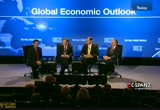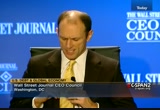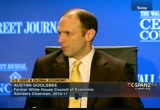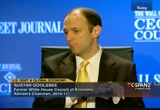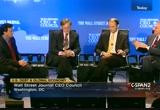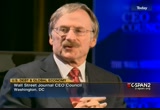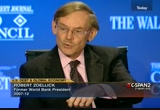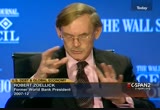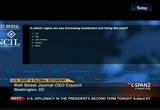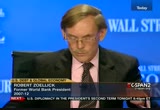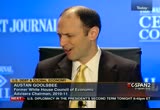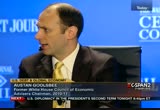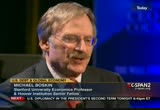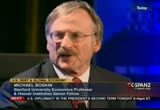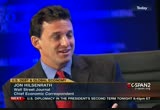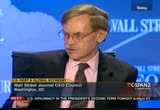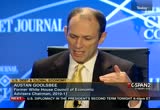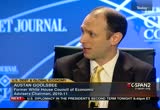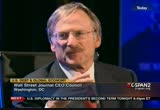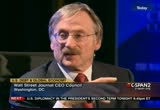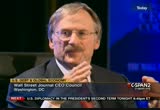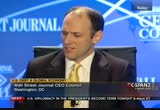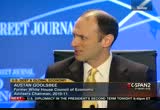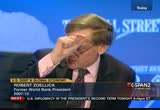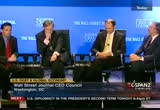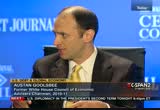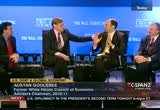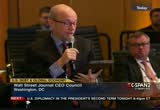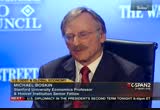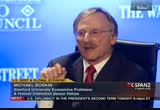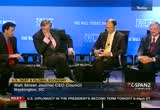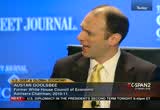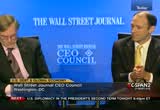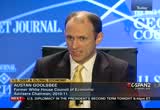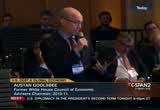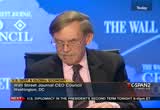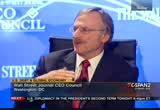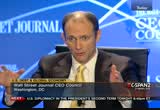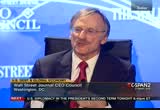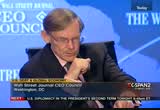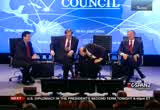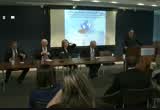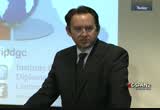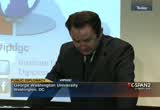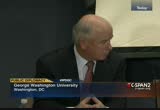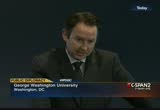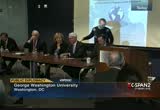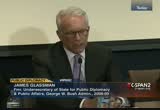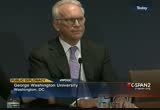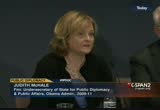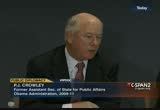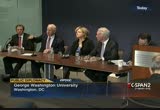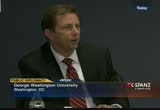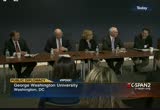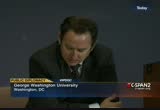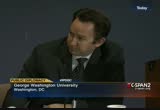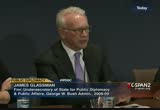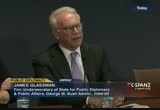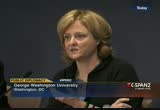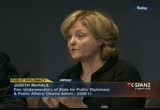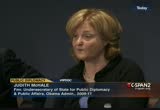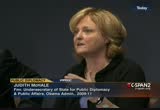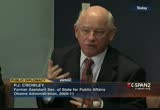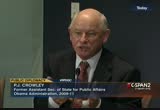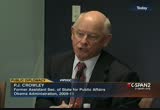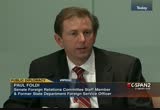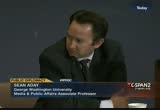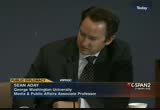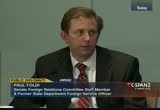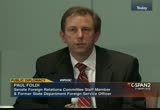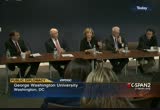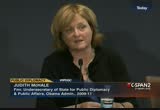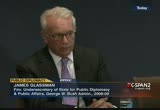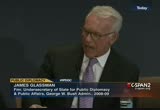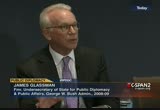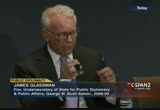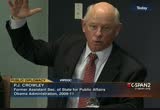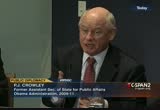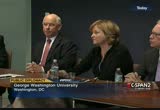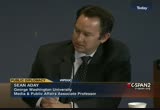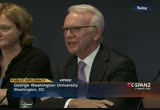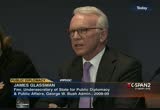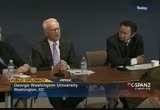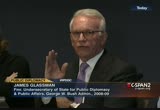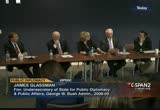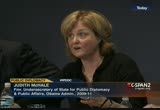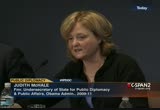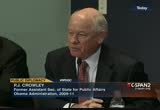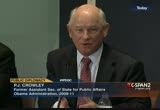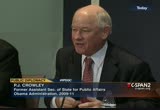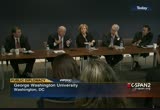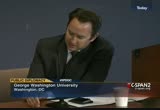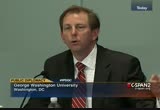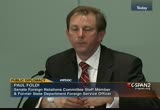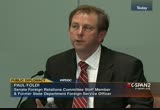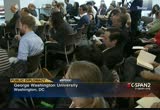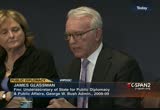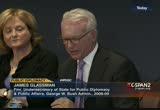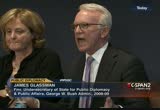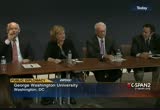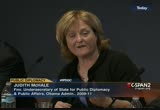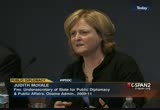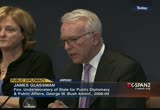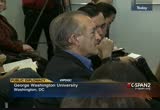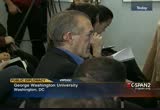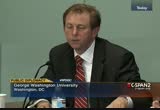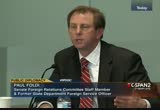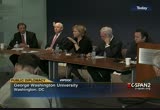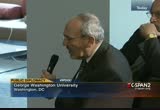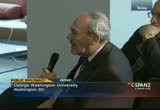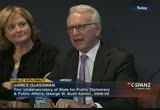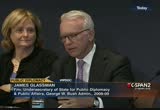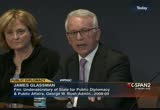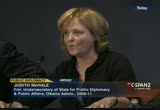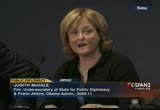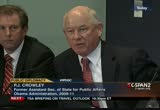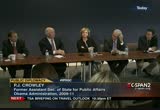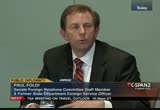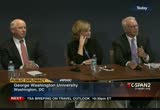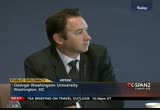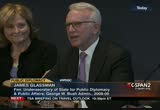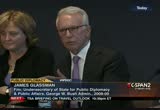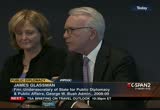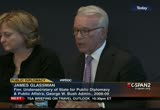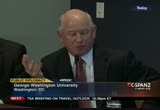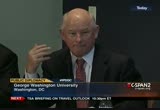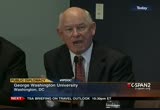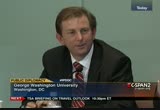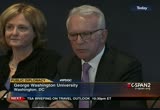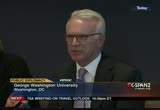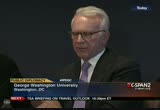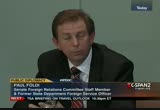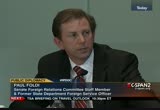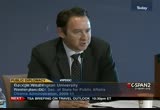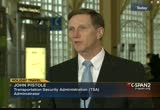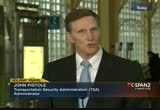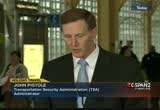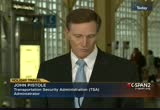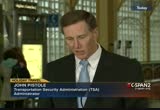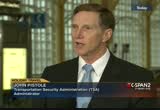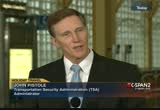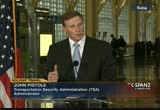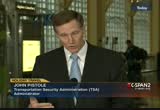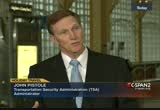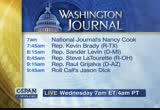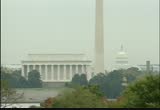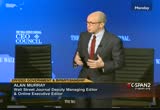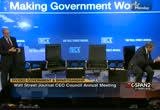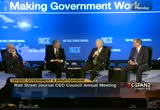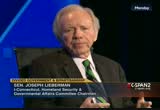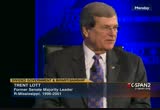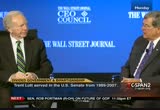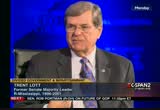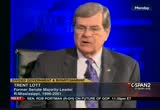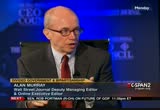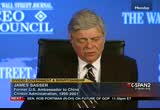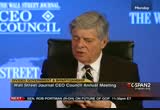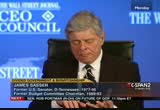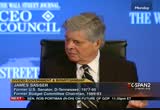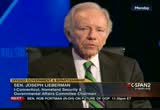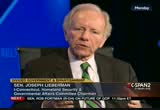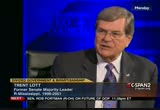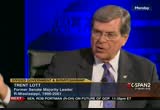tv Tonight From Washington CSPAN November 13, 2012 8:00pm-11:00pm EST
8:00 pm
>> policymakers to talk about the global economy for the next 30 minutes. we have a wide terrain to spend. to the left is robert zellich, former president of the world bank. austin, former chairman of the economic advisers under prawsm, and michael who spoke last night briefly, and he's the chief economic adviser for george hw or bush and now a stanford economic professor. i want to start out with the united states. for people in the room understand the president as well as us and golsby. people ask what is going to come of this fiscal cliff. i'd like to look through the fiscal cliff asking you to describe to us how do you see the budget negotiations playing out over the next six months? >> well, feels to me like they almost had a deal last year.
8:01 pm
the principle bottleneck last year was not that the president was unwilling to offer cuts. it was that there was a group of republicans in the house who wouldn't go for the revenue, and i think that's still the bottleneck now. you probably saw the article this morning from hubbard, what boehner said, and i take from this collection some optimism in 20 # 13 the way it might play out is whether we go over or don't go over the fiscal cliff, you know, there's a lot to happen in the next three months, that we get to some space where if they did a trillion dollars of cuts and reforms to entitlements, a frl on discretionary, a trillion in new revenue, a trillion in saved interest only because the budget doesn't understand net present value, but that's okay, but if
8:02 pm
you did that, there's a grand bargain in a way that would be, i think, a pretty good accomplishment for both parties. i think that the principle thing in that is is can you gent a significant chunk of republicans in the house to support anything that has a trillion dollars of revenue in it. >> you think they reach a bargain, move quickly over the cliff. what happens to get to the bargain? >> yeah, sorry, i thought that's what you were asking. >> yeah. >> i'm pessimistic they will be able to sort out that bargain in the next two months so i'm afraid there's -- i think a serious danger, they go over the fiscal cliff in the short run because they are the same people and it's the same dynamic, feels to me, what happens last summer, and one thing i'm pretty confident is not going to happen is the president is not going to agree to something that's going to just kick the can months down
8:03 pm
the road and put everything back again on to the debt ceiling negotiations which still have to come in february or march. that's what happened at the end of 2010. they thought they were doing a bipartisan agreement that would show, look, the two parties can do it together, extend tax cuts for two years, and that took away all of the -- i don't know if you call it leverage, but took away the points of negotiation leaving just a debt ceiling negotiation in which the president had nothing to offer or demand and the other side had nothing to offer, and it was just a no deal. >> here we have this scenario, a grand bargain, volatility before we get there. is that how you see it playing out as well? >> i think it's difficult to get the fiscal cliff resolved in a major way and because of what we said last night that the
8:04 pm
democrats have a advantage if they let it expire, baseline changes, republicans have a different set of incentives. i believe this is not just about numbers. i disagree with austin's characterization of what caused the grand bargain. this has been a lot of reporting by people in this room and others that the president moved the bar on how much revenue he wanted, and boehner said he's not going to negotiate with him so i think the following is possible for republicans to go for, in the end, a serious entitlement reform, not as much as they'd like, but one that's structural, not just numbers that might evaporate, changes in retirement, benefit formulas, enforcement mechanisms, that any revenue, be a modest portion of the total, perhaps more than they'd like, but substantially on the spending side. all the evidence is from all the
8:05 pm
post world war ii fiscal consolidation, averaged $5-$6 of spending, not cut, for every dollar of tax hikes. it doesn't have to be exactly that, but successful in the sense they consolidate the budget and avoid recession, and also that the revenues come from base broadening. i propose a people as well as activity, but base broadening, not rates. that's easier to do if there's tax reform as well, and there's some pro-growth policies along with it, and maybe that's a way they both can agree and kind of skip the intermediate step. >> two people say we go over the cliff. how about you, robert, are you expecting that? >> well, there's a lot of deal makers, and what's important is what's on the table in terms of tax reform and entitlement reform makes reagan look like a piker.
8:06 pm
there's the book on tax reform, knows how hard it was with good people so the point is -- >> [inaudible] [laughter] the point is in the fiscal cliff or in this period, we're not going to get this done. joe lieberman outlined a potential approach. some set of cutting, maybe a little bit of modest revenue. you then move back to regular order which trent talk about last year, but then you need mechanism like a simpleson-bowles two to enforce discipline. my worry is, and this is where i disagree with bob woodward, you read the reporting, and frankly, the people negotiating on both sides don't know the basics on negotiation starting with the fact you need one piece of paper, not competing pieces of paper that says this is what we agree on and what we don't agree on. i think the bottom line, if i were a ceo, what i'd be worried about is if the people just talked to each other opposed to
8:07 pm
negotiate and kind of pontificate the positions, which is what we see now, but could change, then i think the president will be very tempted to say let the tax cuts expire. it's not sustainable because the alternative minimum tax and other things, but he thinks it gives him leverage going into next year. that's gutsy given the state of the economy, but people have to be prepared for it. >> three people saying we're over the cliff. [laughter] let's talk about the rest of the world. we have a question we wanted to ask if we could call it up. we want to ask the ceos in the room where are you investing in hiring in 2013, and which region the united states, asia, latin america, europe, or africa? we'll put up the answer as soon as it comes in. let's start talking about your global growth outlooks and where
8:08 pm
you all expect growth to happen. starting with you, report. >> well, the -- call me bob. >> sorry. >> the striking thing is over the past five years, two-thirds of global growth is from developing countries, and as recently as the 1990s, that number would have been in the 20s. u.s. exports in ten years went from 25% to developing countries to 50%. combined with what we heard about europe and in a sense the demographic problems in japan, there's a shift in the international system you're going on, and a lot of those countries will also have challenges like in china with avoiding the middle income trap and the structural shift, but what i want to connect to is this stuff we're doing at home in the united states is not enough. the united states then needs an international economic strategy, some of the things that prime minister asner talked about so it leverages a domestic revival with a new international growth system because the old system is no longer going to exist in the
8:09 pm
old form, and we got rising economies, and you got markets there, africa grew at 5% a year for the decade before the crisis and now back on the growth progeek story. there's potential in all of them. >> can they keep up the pace of growth they demonstrated in the last ten years? we're already seeing china slow down. the last ten years a signal over the next ten years? >> varies by economy. china slows down. one child policy, less labor into the market, going to the critical issue of what we did with our report with china about the middle income trap, how you increase, keep productivity, how you keep growth going getting 5,000 per capita income. this creates opportunities. some of the things they have to do is open the service sector that helps the united states. the trade patterns, the supply change, investments, talking to a ceo last night whose major
8:10 pm
company was bought out by a chinese company. you'll see -- what's important for the people to recognize is not just in trade or growth, but whether it's investment, remittance, tourism, exchanges, each of those provide opportunities. >> austin? growth? 2013. >> look, the u.s. is growing 2%, maybe, which is not good. that's the fattest of the advanced world. that tells what has been wrong and is wrong. >> what do you make of the answer? >> if you look at the u.s. context, other than the six to nine months of bumpiness, the fact that major companies are investing is likely a forward looking indicator, but the population up 10 million since the recession started, household
8:11 pm
formation close to zero, historically housing related, call it construction, real estate, some, you know, household oriented manufacturing is about a third of a normal expansion. it's a highly cyclical part of the economying and we've gotten zero from that for multiple years. as we start to turn the corner, even if it doesn't go back to the go-go days of the 2000s, that still is beginning to add some significant component to the growth rate in the u.s., and, you know, we could probably get up some place well above 2%. i don't think those numbers are that surprising. i do think on average, emerging markets grow faster. they start from a low base, but when they go wrong, they go terribly wrong. that's the history of investment in emerging markets. we want them to keep growing the
8:12 pm
way they've been growing. i mean, as bob said, that's the -- europe's, at best, going to be stagnant in the medium term. japan has had well documented growth problems. it has to come from the emerging markets theater. you shift to exports and investment-led growth, it's to those markets. >> is it a bode of confidence to the u.s. economy? >> i don't know you can take those at face values. i want to know where the existing investment. those percentages should be comparedded to the base as well. >> where they are increasing investment and hiring the most, but, still, a lot of the -- >> but the increase could be because they got a lot of stuff they are replacing. >> right. >> you increase 10%, be that doesn't mean all of it is new stuff, okay? second of all, the u.s. is --
8:13 pm
has a variety of things that could lead us to stronger growth. we should be growing over 4% for several years out of a deep recession over previous recoveries from previous recessions. it's been a delayed a variety of reason, not worth arguing the causes here. i think some was policy, probably more than os p would, -- austin would, but we can skip that. in asia, i think the big issue is china, and i think they are going through a leadership transition, and whether they're going to brace the kinds of reforms that the world bank and china development research foundation group suggested, emphasizing state enterprises, domestic demand relative to exports, and a variety things of that sort, land and labor and financial reforms, the pace of that is still very much up in the air so the good news is if they have a financial or real estate problems, they have such
8:14 pm
large foreign rereceivers, 3.3 trillion, such a high saving rate and a political system that can cover it, okay, rather than fight about it. i think that this is somewhat relevant, but not dispositive. the u.s. has put some takes, fiscal cliff is one, continued deleveraging, continuing difficulty of medium and small buzzes getting capital is a big drag, but on the other hand, there's energy prices low. you've got a low relatively -- natural gas, you got housing, having apparently hit bottom, starting to turn, so there's a variety of things. there's a lot of money on the sidelines. >> you raised china. talk about china for a second. the united states, europe, japan, latin america, asia excluding china, every one of those regions experienced a financial and economic crisis in the last 20 years. china stands out as not having gone through such turmoil.
8:15 pm
can they continue? can they keep that up? is china the next country that we have to worry about for some kind of economic upheaval? >> i'll start. well, the short term, i think what's important for people to understand this year with the political transition is the chinese leadership has a real fear of inflation, and this goes back to 89. they were going o error on the side of being careful with food prices, higher inflation. now that they are threw that, what you start to see if they've got the resources to be able to avoid a hard landing, but the critical question, which michael raises in the china 2030 report raised is they, themselves, realize they can't rely on the structure for growth over the last 30 years. people in china talk about the lost decade of the last ten years, even though they grew 10% a year. they talk about the fact they have not undertaken serious
8:16 pm
reforms,, and so, for example, as the labor force shrinks, more leave it than coming in. they have to move up the value added chain. i think what you see now is a bit of a debate as people say, well, look, should we avoid a hard landing or credit expansion and so forth, and others, yeah, we can do that, but that builds the basis of future problems so we have to make structural shifts. in the way china works is incremental, and i think that the ping, who i got to know over the years is a good chairman, you have to have factual powers, state-owned enterprise. i expect a move in this direction, but in a gradual process, and what i share with people is that the central bank said watch the third platform of the government, and then you see the shape of the this going forward.
8:17 pm
the bottom line is if they don't make some of these changes, they have the resources to cushion it, but, yes, the history, there's a lot of imperfections in the market, in pricing, credit, and in others, and the history of the developing markets is that you got to move the reform process, but it's true for jay pap too. -- japan too. >> high growth covers problems. when you slow -- >> right. >> it goes until it can't go anymore. >> it stops. >> growth is slowing now. >> there's two parts. >> economic reform, the long run growth rate, and then is it a property bubble, a financial bubble? i think one reason why they accumulated huge reserve is the implicit understanding that there's potentially some major capital holes in the banking system that people got to think about. i mean, it's hard to -- the governor told me that the median
8:18 pm
house loan to value ratio in china's only 50%. implication being so there won't be a big problem like there was in the u.s.ment i -- u.s.. i think the problem is the debt is not held by the homeowner. it's -- there's now huge debt accumulated at the level of the builders. i think there's a danger. the financial space that chinese banking system, there's a danger in that. the chinese are aware of it, you know, trying to think it through. the second thing i think is you don't really know. we don't know. there's no way to take the official data or the official accounting and determine, oh, here's what the situation is. i had a colleague -- the following changed a little, but it's still basically true. he studied chinese gdp, said in the u.s., the data comes out a month after the quarter ends, and it's revised for up to two years, and sometimes revisions are big. you know, end of 2008 was minus
8:19 pm
three and a half to minus 8.9. in china, the data comes out the day the quarter ends and is never revised. [laughter] why wait until the last quarter to announce what it is? [laughter] >> they tell you what it's going to be in the fourth quarter. >> they tell you. now they wait seven days or something like that, but i just think you learn more about the actual details of china, as you know, from talking to people doing visits. you talk to fred smith and say how's the -- how are the package shipping coming out of china, what happens a lot of times is that's more informative. >> you like to think china can manage the transition, and the lesson is there's not soft landings. >> i'm nervous about that. >> i'm nervous about that. >> i think that's correct. there's a risk of a harder landing. slowing from 10% growth to 8% growth is equivalent of us going
8:20 pm
2% to 0%. but 10% to 5% unemployees massive amounts of people and stopping opportunity for community massive migration frft countryside into the cities seeking employment and create instability in the country. they want to keep growth up. bob's right they have a fear of inflation for lots of reasons, historical and actual serious inflation, and that was in commodities that are a large part of the typical chinese person's budget, food and energy, much larger than here. they are not happy with our extremely loose monetary policy, exporting inflation to them, ect.. i believe that's an issue, but i believe they are capable of acting quickly and filling the hole in the banks. that's a much harder thing. we didn't do that. the president had a proposal, secretary geithner in march of 2009, but it didn't go far. we had a gradual recapitalization of the banks, raising $300 billion of capital,
8:21 pm
assets more concentrated in the largest banks, but the -- so that's a positive in that sense. our banks not as weak, but recapitalized by fed policy taxes savers. >> talk about the fed and world central banks for a second. central banks pumped $11 trillion into the global economy for the last four years. look at the balance sheet expansions. will this end badly? all the money central banks pump into the world economy? start with you, michael. you've written about this. >> i think it's a serious risk. i don't think it's imminent, but i'd make two comments about it. one is it certainly appears that the -- these extraordinary types of quantitative easing, non-traditional measures, hit the returns awhile ago and doing little good now. the more that's done, the harder the exit strategy will be. usually the fed just has one policy lever to worry about,
8:22 pm
that's short term feds funds rate. an in the pass, raising it to forestall future inflation is too late or a bubble like in the last decade. partly for political pressure; partly of human inability to forecast the future. now they have a doubly difficult thing because they have to shrink the balance sheet, maybe passive, but as well as raising interest well. it's complex. they have tools to do it at the fed, ect., but the question is whether the complexity of it all and the political pressure will wind up causing serious problems down the road. they are going to be in a situation where they have to raise interest rates and take capital losses on their portfolio simultaneously. that's awkward. >> i think you had regular breakfast or lunches with the fed chairman. do you think this central bank is up to the task of exiting? >> look, the thing is i knew ben
8:23 pm
bernanke before when he was just an academic. he was in the monetary economics group at the nber, and everybody in the monetary economics group there woke up in the morning, looked in the mirror and say, why not me? you know, why ben bernanke? i'm in the mop tear economics group at the nber, and then sometime around 2008, they all, oh, he's messing it up, thank god it's him, not me. the thing is -- [laughter] if i'd told you, 15 years ago we will be in a moment in which gdp growth is less than 2%, inflation, core inflation in the u.s. is well below the 2% target, and unemployment at or around 8% for multiple years in a row. everyone would would have said n monetary policy if that's the circumstance, and if you plug into the formula what should the feds' fund rate be, it still says negative 3%.
8:24 pm
therein is why i think it's totally understandable why ben bernanke and the fed are trying to loosen monetary policy when interest rates are zero. it's that -- i agree with mike that the effectiveness of that was highest on the first qe, and then the second -- >> bob, is this a risk the men and women in the room have to think about? inflation, a collapse of the dollar? where do you put that on the list of conditions that they have to think about it? >> first, as already was said, diminishing returns. second, you have to watch where the risks start to arise. is if you look, for example, at farmland prices in the midwest. they are above, in real terms, the late 70s highs. you don't have the same leverage, but rental prices and others so i think each market, you have to watch where is the money going? where is it going in terms of, perhaps, some asset price
8:25 pm
inflation opposed to goods price inflation in third thing, be fair to the fed because other people have not been doing their job bringing us right back to the discussion about the budget package and other aspects. that is critical so that we can start to unwind some of this highly unusual stuff, and the last thing to connect it back to what we talked about with the international changes, the foreign minister of australia said something that struck me saying the united states is one budget deal away from restorying global preimminence. he was not just talking about economic resources, but sending a message to the world that the united states can get its political system to act and lead because europe's not going to lead, japan's not going to lead, china's as you described, and others wait for the united states. big, big stakes on the table. >> we've talked about risk. bring up the next question that we've got for the group. we want to ask all of you what are the risks, there's risks you can control and the risks that you can't control. we want to talk about the
8:26 pm
biggest worry on the global landscape. this is in the realm of worries you can't control. u.s. fiscal cliff crackup, a euro crisis, a china slow down, a middle east energy crisis, or some other risks. >> where's iran? >> we'll put that in middle east energy crisis. >> not under other, huh? >> no, no, i think that belongs in number four, and while our executive give answers, i want to ask you, what's the risk that the men and women in the room, that should be keeping them up at night right now? >> look, i think there are many ironies surrounding the fiscal cliff. the fiscal cliff, i think, in the short run is the most pressing thing, the big thing is the eurocrisis, and i'm of the view that ultimately either the germans have to subsidize permanently to hold it together
8:27 pm
or the eurozone is doomed to break apart, but on the fiscal cliff, get your heads around the correct numbers which is if we sign a long term grand bargain budget deal, we're going to be doing the fiscal cliff every year for the next ten years, okay? the thing happening with the fiscal cliff is made worse by the fact it's going to happen without a lot of preparation and it's not thought through if the sequester kicks in. we have to do $4 trillion over ten years. that's approximately $400 million a year. get used to it. it's the business we've chosen as they say if with the "the godfather" movie. [laughter] if you're in the room, this is what you should be afraid of or thinking about is i didn't mean to influence the vote if that's what happened.
8:28 pm
[laughter] in 1986, okay, we've never had a tax reform that raised revenue before, and always when we've done big tax reforms, the way we do is is it comes down as winners 5e7 losers, and they say, we'll give a bunch of people a tax cut, others held the same. in 1986, let's remember they were not able to make it revenue neutral on individuals, at the last minute, they came and put it on corporations saying it's a tax cut, but corporations will have taxes go up. there's a danger if that happens again. where do we get the money? try to stick it on corporations, and i think you should be nervous about that. >> allen had a question. >> we have one question that's come in. is a $4 trillion grand bargain large enough given the continuing growth of the debt? how worried are you about the impact of interest rates
8:29 pm
increasing in the future on our interest expense? >> it's step one. the fiscal cliff is step 1a, and the $4 trillion that people are talking about, if done properly, would be quite expansionary in my view, including helpful short term as long as there's not a big front loading of tax increases and especially tax -- any tax increase and spending cuts. i think all of the data suggests that i would say on -- is it large enough if it starts to include a serious entitlement reform that grows in the second and third decade, it's a very good down payment, but there is a risk it rises for a variety of reasons in two or three years, whatever it happens to be. i say that the single best thing we can do is do a real serious debt reduction deal, studies
8:30 pm
i've done and i've studied, estimates i've made is we stay on the current debt path as predicted in the president's budget or the cbo, we could wind upbringing growth to a halt in a generation with standard estimates to the fact of higher debt ratios and higher taxes, financial instability, ect., from growth, say from the imf, and the political pain of the debt reduction would be offset by a large economic gain in higher standards of living and higher gdp per cap da down the road. the problem is it doesn't show up in the short term, and it's politically painful. again, republicans are not going to be tax cleaters, and shouldn't for an ever-growing welfare state, but there is a tax reform and grand bargain including revenues from base broadening, and also hopefully from lower rates, ad broker base, and comprehensive tax reform to generate extra growth to be sufficient to perhaps get democrats to agree to serious
8:31 pm
entitlement reform. >> did you want to add, bob? >> i would like to flip this for the ceos. i think there's an opportunity here because normally congress' preference is to main maintain the status quo through inaction. the cliff requires action. it won't solve the problem, but the question is how does it set up a probably solution? if you think that, frankly, if the people in the room and others keep really pushing for corporate reform, a repeat of the types of 1986 base broadening and lowering of the rates, an effort to get entitlements in a serious way, and i personally, i can't speak for them, i think you find republican flexibility on this if they feel it's not just medicare taking money away from the producers or the dock fix which gets put back in. if it's a serious step with retirement ages, and, remember, this is where none of you understand how washington talks
8:32 pm
about cuts. nobody's talking about a cut. they are talking about a reduced rate of growth. it's not the way you cut. where the republicans get attacked by people is to say, oh, you want big cuts. they just want a lower rate of increase. if it's done in a way that doesn't have disciplines or doesn't change the law almosts feel they have been taken to the cleaner again. you can get a deal here, but that's back to trent's point. in the american political system, there's interest in the senate, frankly, boehner's serious about doing something, cantor, worried about looking like an obstructionist, but it won't work if the president doesn't lead. he has to set the course in the system. you saw that in the 80s and any part of legislation that i was a part of. >> on the one hand, you used the word "opportunity," and we see the ceos in the room say they are investing and hiring in the
8:33 pm
united states, but they are also remarkably more worried than europe and other problems we've talked about about -- >> what is that telling you -- >> it's consistent. >> this is more imminent. that's probably why. >> all of those -- it also tells me there's an opportunity here, but if it's missed, then we're in trouble. >> it's a big opportunity missed. >> i'm telling you the primary barrier to getting a grand bargain has been an opposition to any revenues in the deal. in the negotiations last summer. the reason why there aren't specific papers that you can read and say what was the deal is because things showed up with bob woodward's book or the washington post. each side feels they don't want to write down on a piece of paper i offer you a, you offer me b. the whole thing is in the
8:34 pm
shakespearean language. one doth considereth a plan, but it was understood what the deal would be. >> people have been doing deals with the congress and the executives for 225 years. >> okay. >> a few other people figured out how to do it. now, frankly, the starting point is i don't put the president sitting at the table with these guys diminishing his value. you know, that's not exactly the way reagan did it. >> if we -- >> get the treasury secretary, omb guy discussing the details, now, not point out and talking to the press -- >> look -- [laughter] the deal of last summer -- did not take place in the press. there was a six week extended negotiation in which they got 85% of the way to a deal, and the format of that deal -- >> you need 100% to close it. >> that's everyone understands that there was not a deal. the question is if there's going to be a deal now, does it look like the one that was almost
8:35 pm
last summer in i think probably it will, and the frame work of that deal was not crazy, but just 1 trillion on entitlements, $1 # trillion on discretionary, 1 trillion on revenues, 1 trillion on saved interest. that's approximately what it is. there's argument over should the 1 trillion of revenue come from high income people, a little smaller, a little bigger, should the entitlement come on social security or medicare. that's all important, but that's basically what the deal will be. you should have in your mind if there's going to be a grand bargain, that's what it's going to look like. >> right. >> it's going to be of that form. >> we're not going to get that resolved. is there io question? >> lower rates and a territorial system a way to stimulate economic growth? >> absolutely. it's a huge problem, you know, we talked last night about differences from earlier periods, and a big part is the tax rates that are now higher than they were then.
8:36 pm
our -- our corporate tax rate is further out of line, not as far out of line, and way out of line as many other countries reduced corporate tax rate. our statutory's rate higher than the oecd average. there's a problem. all of you out there talking about the fiscal cliff and all, that's fine and whether you slope down or not, but if you think a major, new bold investment program, going into a new market, expanding a new technology, ect., you are worried about what the tax rate will be when that's generates cash in nine years. the best thing to do is create a lower rate, an expectation that there's not giant tax increases later. >> i agree with that. i think we should do in, but, a, you know we have the highest statutory right and no higher than average effective rates because we have the narrowest base of owl corporate income in the world. >> yeah. >> one of the reasons we have that system is because people
8:37 pm
like us argued for many years that the more efficient thing, the more, the better way to encourage investment was not to cut the corporate rate, but to have massively accelerated depreciation, expansion of investment, focusing on incentives rather than cutting the rate overall. i think the intuition is changing, but the way we're going it cut the rate is not by closing loopholes, but come out a painful expansions of the base like getting rid of accelerated depreciation and things which have a value so i think -- >> is that going to happen? >> i don't know. >> six month windows -- >> it should because that's one part of tax reform you can do revenue neutral in pretty straightforward way, but i'm afraid they are going to -- in the effort to lower top marginal rates on the individual side, it could come back to corporations saying they don't do it. >> it would be better to
8:38 pm
integrate the personal tax for a lot of reasons, for efficiency reasons, number one, and number two, we could put the end of the nonsense warren buffet pays a higher tax rate than the secretary -- >> you can do that in five years. >> it's a difficult thing, but aim towards that as a goal. >> another question. isn't going over the fiscal cliff, 76% of the people in the room worried about, the equivalent of the grand bargain because we have higher taxes and lower spending. >> i think that's what you were saying. >> different only in that it's only one year. a grand bar begin does it for ten years. i think that's amazing. >> do you always -- >> there's a lot of details in this including the at terntive minimum tax is, and they tend to be blue states. if there's state and local income tax, children, it's not politically sustainable. it might be a negotiating step to create a further crisis to a chief it, and the defense cuts
8:39 pm
are not sustainable. >> do you agree the fiscal cliff, the u.s. budget problem is the risk that the men and women should be focusing on? we talked about other ones, but what's the one that should be keeping them up at night? >> well, i'd go back to this. secretary geithner here, talking about this, and austin explains the past deal, but ask secretary geithner what's different that's making a deal this time? how do you qiews the cliff to set it up? if the answer is a mandate to raise revenues, that's not enough. ask him. he's the decision. he's close to the president on the issue. i would flip it. again, but i'm an on the mis. i think you could make this into an opportunity to address the things we talked about in 2013 if you keep the pressure on with the types of things as like a simpson-bowles sort of fall back or requirement, but i would at one last thing that's not part of the debate, and in audience
8:40 pm
has got to drive it. you need a compliment regrowth initiative. we're stuck on trade. look at where the growth comes from. whether it's the types of things with the transatlantic, the partnership real because right now it's rhetorical. there's things you can do with middle income countries, some of their structural growth agenda, things on the development side to do for agriculture and others that the president's doing. we need an international complement, not just an isolationist fix. >> we have two minutes left. >> yeah, another question. how about a jobs program? get people off the dull, build infrastructure, reduce welfare costs, people used to working and spending again. >> jobs growing 20% of the pace of deep recessions. it's a jobs crisis because of the growth short fall. we need the economy to grow more strongly. most of the kinds of things talked about, a sensible fiscal consolidation would be good now, and people understand the tax
8:41 pm
rates are not going up down the road. corporations could begin to plan, uncertainties removed, and they have a notion of what investments are when they pay off. there's a lot that can be done along those lines. >> there's also, if you look at the entitlement programs, it's not disconnected. what's happening in europe these days, people realize with endless unemployment insurance, people don't hustle for a job. look at the what is the social security disability increases are. some of it is in your paper. the entitlements reform is to create incentives for people to work. >> >> i'm now confused. i don't know if anyonements to own up to the question. [laughter] 73% -- i think it was 76% of us are worried about the fiscal cliff causing a recession, yet not one of us forecasts a recession. what do you make of this? >> it's the same thing, business
8:42 pm
people do not think we're going off the cliff as we run up to the election -- >> but you say we are. >> they'll figure it out, they are not stay stupid they'd let s happen, but, yeah, they are. [laughter] they could easily be that stupid. [laughter] i think in business, a lot of oh, it's coming to the last minute, but it won't happen. it'll be fine. i don't know. >> i think there's something you have to understand is that both because the political system's messy and country's interests are divided between people who are collecting and people who are paying between urban and rural and ideologically and so on. there really is not a coherent sense of an overall strategy that where we want to go, where we want to wind up, a european social welfare state like we were before the crisis ect.. there's big disagreements about that and hence disagreements about how to get from here to there, and the notion about what to do in the short run
8:43 pm
intimately tied up with big, big spreads between republicans and democrats to oversimplify because on taxes and size of the programs and what's important even in republican party, there's three conservatives, tax cutters, budget balancers, and spending limiters. st's strange so i think it's important to understand. it's not steanble because the mt and other things, but there's a chance that whatever they do in the lame duck will be very modest and far -- >> 45 seconds left. you each have nine seconds to answer the question. can the united states economy go back to being an economy growing 3% a year? >> deaf lit any. the flip was if you look at the energy story, if you look at the rising banks in china so that
8:44 pm
now you actually have some opportunities in north america, and, by the way, think about that as a base too economically along with canada. if you look at the -- >> [inaudible] >> huge potential, but get the fundamentals right. >> austin, michael? >> yes. >> can we be a 3% economy again? >> end the housing recession and moderate construction, we'd be there. >> sensible policies followed, monetary and fiscal, getting spending under control, entitlement reform, not letting tax rates go up a lot, but lower rates on a broader base. if we don't, the debt implies that tax rates are # going for the broad working class, 70% to pay for ul the sending. it's hard to imagine a robust growing economy where a majority of the working pope pewlation is a minority partner. >> we're well over time. >> deficits. >> okay, everybody join me in thanking the pam.
8:45 pm
8:46 pm
administrations talk about student exchange programs, social media, and voice of america broadcasts. from george washington university, this is a little less than two hours. >> i think it's going to be a great event. judith jumped the line at union station and aannoyed probably 150 people to get here. >> [inaudible] >> that's action. i hope they were not from other countries. i'm a professor here at gw and director for institute for public diplomacy and education hosting this event. find us on twitter. we're also on facebook, and we're also hosting a conversation on twitter about this event, hash tag ipdgc, and i welcome you to participate in that happen what i'm going to do to get this rolling is give brief introductions and bios for
8:47 pm
the great panel here and get going into the discussion, and we have a lot of interesting people in the room so i know we have to leave time for discussion. first, we have ambassador glassman, executive the george w. bush institute. after a long career in journalism, served as sunder ceo tear of state for public diplomacy and public affairs, and prior to @ state department post from june 2007 to june 2008, chairman of the broadcasting board of governors, which is something we'll discuss today. judith, the former under secretary of state for public diplomacy and affairs serving from 2009 until recently, 2011. >> july 2011. >> thank you, before that, chief and executive officer for discovery communications and general counsel for mtv networks. paul foldy, skipping p.j. for a
8:48 pm
moment, paul from 1990 to 2003 served as a u.s. diplomat in the department of state working at u.s. mission in pakistan and nick ray gray, and final position was the liaison to the ambassador of the united nations and received as a state department fellow on the staff of senator biden's foreign relations committee. in march, 2008 joined lugar's staff seen your professional staff member as committee expert on u.s. public diplomacy. last, but not least, p.j. crowley, served in 2009 and assistant secretary, spokesman of the department of state until march 20 # 11, at global communications here at gw, and in the clinton administration, special assistant to the president of the united states for national security affairs on the staff of national security council and served as principle
8:49 pm
deputy assistant for public affairs, spent 26 years in the air force retiring as colonel in september 1999. okay. i want to get us started by going back four years, and the inauguration of barack obama, and a lot was made at the time about how, at least on one side of the aisle at least, that barack obama was a walking, talking example of public diplomacy in action, and he was going to change america's perception in the world, and do all wonderful things like close guantanamo bay and end torture, gave very important speeches in osloy and cairo, and, yet, four years later, the opinion of america and things american improved here and there, but not to the degree of which a lot of people, including people in the administration expected them to in this period of time. if you look at the global
8:50 pm
attitudes index, for instance, the most recent one, and it's in negative territory, in the he's, china, india, and about the only things that the rest of the world likes about america are movie, tv, science, and technology. they are not keen on the democracy, as least as america preaches it. heading now into another four years of the obama administration where are we, and why are we here, and how do we get somewhere else? how do we live up to that promise? what went wrong? what's going right? what can we do about it going forward? >> simple. [laughter] well, fist of all, i don't think that favorability ratinging in
8:51 pm
the surveys are evidence of whether we are doing something wrong or right, and it's a huge mistake for anybody who practices public diplomacy to think that his or her job is to win a popularity contest. while i guess maybe some of us in the bush administration can take a certain pleasure at the fact that in 2008 the favorability ratings for the united states were higher and four out of the five surveyed arab countries, i'm not going to bring that up. [laughter] no, but i think it -- i think it's a big mistake, and, you know, in my view, and what i try to do in the short tenure as under secretary is try to disabuse people of that notion and rather focus attention on
8:52 pm
what public diplomacy can do to achieve specific ends part of their goal in foreign policy and national security policy. that's what public diplomacy is supposed to do. now, if everybody loved us, it may be easier to achieve those goals, but it's really hard to get everybody to love us. that's a long term project, and generally, a futile project. it's much more important to do as president obama said right in the beginning from the inaugural speech that we need to focus on mutual interest and mutual respect, and there are many things that we can get done in that fashion. i think that discretionary -- diplomacy 230e cueses on specific, strategic goals, and if it failed in any way in the last several decades, it's been that it's not focused on those goals.
8:53 pm
>> i'm in agreement with jim on this issue. it's note a population contest, but it's absolutely the wrong -- the results are not great results if that's the measurement. one of the things that we tried to do, again, building on the base that jim and his team put in place was to be sure that everything we were doing in public diplomacy actually was designed to support the achievement of the goals, objecteddives, and be clear and precise in doing that. there are many areas where we do -- have not just given up the ship sort to speak, and there's areas of common interest, science, technology, education, all of those areas, even in countries where we have a very, very difficult and challenging time. i found that people were very anxious to continue to have that conversation with us, and so we were constantly looking for ways, where are those avenues that are open? that ce with pursue because at
8:54 pm
the end of the day to the extent we can extend and have mutual understanding between our country and countries around the world, we will be able to go down a sort of more productive path in the future. it's, you know, in the understatement of the morning is it's complicated, a very difficult and complicated world in which we operate, things that are changing very, very dramatically, and for us as a country, one of the thingings found, i mean, there's many obstacles to encounter by virtue of the fact you're the last superpower standing. it was easier with a clearer choice between us and others, but when you're the last superpower, naturally, you're going to encounter a lot of sort of resistance and what have you b #u that's no reason to give up, and you look for those avenues where you can pursue conversations, where you can build relationships even in very difficult and challenging parts of the world for us, and,
8:55 pm
frankly, you don't ignore the research. you actually see that. you look at it, but that shouldn't be the -- i don't believe it should be the measurement. >> and, but nonetheless, the -- while we will always be challenged because there's something that, you know, a particular country, you know, for example, indians have expectations in terms of the u.s. policy towards pakistan, and pakistan has expectations towards the u.s. policy towards india, and those two can't, you know, do not easily, you know, coexist, and when you -- as a policy over many years, you sit in between those two long time antagonists, you're going to be disappointing both of them to some degree or another, and, yet, one of the great challenges for public diplomacy, you know, is to bring the gap between words and deeds to narrow that to the extent possible. i mean, to shawn's point -- so
8:56 pm
public opinion polls is not the be all, end all, but it is a barometer that you need to pay attention to as you not only make sure that there is a public diplomacy dimension in the policymaking process, still one of the great challenges, you know, within the building that all of us have worked in, is do we take into account what global expectations are for the united states as you said, as the lone superpower, and that enters into our thinking about how effective a particular policy will be, you know, to the point where we're on a roller coaster. the challenge for barack obama was that expectations were so high coming into office, and, in fact, in year one, year two, there was, in fact, a
8:57 pm
restoration of some confidence in the united states, and then predictably as we, you know, for example, made a run at peace between israelis and palestinians in one part rt world, there's been a corresponding disappointment, you know, when that attempt, you know, failed last year. this is the nature. we have to do both. focus on the long term, a significant element of public diplomacy, but we also have to pay attention to, you know, trends and it should inform what our short term and midterm actions are. >> thank you for that very easy softball question, and if in the answer, just yes or no questions, makes life easier. >> secondly, as i was trained, i'm here representing myself, neither senator lugar or anybody
8:58 pm
else. words are mine and mine alone. it's interesting, and it reminds me of the difficult tee we have in the field of public diplomacy because we don't have an agreed upon definition of public discretionary ploim sigh. we have our own definition of god and public diplomacy. what you described is just strategic communication, a much more short term results oriented campaign, if you will, rather than public diplomacy that takes years, takes years to get what i call the benefit of the doubt, this i believe is the goal of the public diplomacy so that when your country does something or has a policy counterintuitive, they go, oh, they're the united states. maybe they do this, but we agree with them, and to me, that's the campaign going on right now, and it's a question of can we get into the benefit of the doubt category for many of the countries? >> let me ask you a yes or no question. >> excellent.
8:59 pm
9:00 pm
from your giving your all jobs, as undersecretary, both of you came in in large part because of what you did when you were there into a position where that job was one that had a lot more, i guess a seat at the table in discussions like that. or at least more effort certainly in the early days of the obama administration to put public diplomacy at the take off and set landing. but that started before the obama administration, some of the work you did. so when your positions, what would she be counseling the administration or how would you structure public diplomacy given the realities of the program and what is at least not for
9:01 pm
national security policy of the united states? >> first let me say that i think -- and acting out with karen hughes who got their seat at the table and i think i was part of her deal to come to the state department. that was good and i kind of inherited that. so what can public diplomacy do in the phrase about being on the takeoff and not just the crash landing. what we can do is to say well, if you have a drawn program, may be a good idea, but understand a lot of people are going to be angry when innocent people are killed or even when not innocent people are killed. that's about it. in other words, i guess i could argue it's a terrible idea to start with, but just bring up with some of the costs are as well as what the benefits are.
9:02 pm
and while our drunk program was to my knowledge not as extensive as the one right now, but they probably ran into all the time was that innocent people were killed and even when they were killed, our enemies are saying that they were killed. so we had to be very responsive, very quick on the draw and say here's what really happened. but then, you couldn't and that we were using drugs. that can make it kind of difficult. so you know, i always thought the public pharmacy, even if you're in on the takeoffs, you're not going to necessarily change the policy. the policy is a given and your job in this case is to mitigate as much as you can. when a sure bet to get into and maybe this is not the time. i really come to the conclusion that explaining and arguing that
9:03 pm
we really didn't kill that many people re: didn't kill any people is not very affect dave, does that really work, even though here we are at the university and we should argue i think i still undersecretary called stop explaining and our natural inclination is to explain. but actually don't explaining works very well and there are other ways to change people's minds besides protesting or sure and not so for you and get this this completed pic that gets them all riled up and maybe this is in the time to go into that. i'm just not sure how affect the view can be in any. >> i think the most difficult and public diplomacy whether it's even nicer if there issues, the apparent conflict between our core american values and
9:04 pm
some of our strategic interests. you don't want to get into a debate with someone about like actually real mckillip two kids, not three. it's not a productive way to do that. i think it's very very difficult for people to understand, for citizens in our country to understand many of the things we do, but it is a tension between national security interest in some of our core american values. i think all you can do and what we were trying to do was to continue to sa said, strengthen those relationships to have a better understanding of all the sordid dimensions of our country and society and the benefits with that and to find those avenues with a long-term view that you are building stronger relationships. the reality even if you have the best relationship in any country, this moment in time for
9:05 pm
strategic interests will divert from their thing that's going to be very difficult. you can't avoid it any other simplistic view of the world if you think that is going to happen. in terms of public diplomacy having a seat at the table, but i believe quite strongly is that it's important that his policies are being sort of debated and deliberated that they be informed by an understanding of how those policies may impact the people in particular countries. that is critically important with the world is now changing, where you have power, traditional power paradigm of two or three people at the top debating or deciding hot countries go, where you know how that throughout society. it's important for governments and governments everywhere to understand how decisions are going to be received by broader society. you don't define policy in response to public opinion in a
9:06 pm
particular country. that obviously is not what we're going to do. but at least as his policies are implemented, and no upfront the impact of those policies are going to be. to some degree, you may feel to influence the policy and terms of how it's communicated, when excommunicated from the tanks may be able to change to make what were otherwise unpalatable decisions somewhat more palatable to a broader population. but back to me is the key role and that's what we're trying to do at the organizational changes that we implemented at the state department and a deputy assistant secretary of state position to be sure that when those policies being debated and decided upon that day had the benefit of the information so it was some form upfront by what potential impact would be. he didn't want to be in a position where you go and do something and they would be received very negatively and of
9:07 pm
what we like how come i didn't know about that. we might have time to differently or communicated differently. a critically important role for public diplomacy to be there at the table to inform the policy makers taking place. >> drums are a particular example -- i see strategic communication is the key element of public diplomacy as the state department in chief for two years. there's a role for explaining policy as part of this. the dilemma regarding drones is drones are a weapon. the weapon of choice in the war against al qaeda, the war on terror and they are currently being used for tactical purpose and a very beneficial tactical purpose. yet public diplomacy has to be
9:08 pm
strategic. and so, the conundrum when you look at drones are a public diplomacy lines is that the short-term tactical effort is undercutting the long-term strategic compelling goal. the obama administration for two years of strategic dialogue and partnership. judith was head of a set committee working with pakistan is on diplomacy issues. and so our long-term strategy with regard to pakistan is to strengthen civilian governance as the ultimate solution to dealing with solution to the united states senate there are two pakistan. this is where polling has its
9:09 pm
place. as appropriate as it may be as cutting the fabric of the relationship between the united states and pakistan. so our public message to pakistan is where a partner and yet the use of drones absent a public support by the pakistani government, that's an unsustainable situation, which are made public diplomacy standpoint but the pakistan relationship is exactly what we have cultivated over the last couple of years in the u.s. human relationship where you had present hottie come to the united states last september. and not only threads of drones i
9:10 pm
approve we don't have that in the context of pakistan the long-term public diplomacy effort is a short-term tactical purpose. you can do that. but as jim said at some point you have to be mindful of the long-term cost for your short-term strategy. >> the drone issue is a short-term issue. we are going to have relationships with pakistan and other countries for the united states is using drones after the program ends. what is the impact of the program on this long-term relationships. and also, depending on whether prior public diplomacy relationship was with that country will tell you how successfully or unsuccessfully to program will be receiving. we are clearly had a
9:11 pm
relationship of the country they understood why we were using this methodology and beit did not seem to go against the grain of what that country had assumed the way we function. it will be more evidence of the relationship. >> i thought it was a good one, giving you the benefit of the doubt because of the strength of that. >> one name untrue thing is long-term diplomacy is enough for a strategic communications. osama said is on the topic of being a long-term affair, that poses challenges that seems to me for the state department trying to get funding for public
9:12 pm
diplomacy from congress. so one of the reasons why we're putting together this panel, not to push you on the spot. >> i'm wearing a kevlar underwear, people, come on. >> you've been imposed, so i am wondering why from the former undersecretary's perspective when you came into this position , what did you discover beauty to your chagrin or not about how working with congress when you're trying to do long-term after his in the middle of wars, were short-term strategic communication goals are really at the forefront. i'm paul, from your give, you know, where is the will and congress to do this? what is it that they would
9:13 pm
support? for instance, controversies around funding for pbg and boa, et cetera, american center seemed to be popular. so where is the well here and how do we get budgets are long-term efforts that are difficult to quantify, whose effects are difficult to quantify? >> a good thing i've seen in my time on the hill is that public diplomacy budgets have never taken a significant lack of entities within the state department. they may have taken has come up for example of the education cultural affairs budget has continued to rise because the thing which really understand is the value and i'll attributed to her, so congratulations. she once said is here in the united states for less than seven days you're a tourist. if you come for longer you can do with a deeper understanding of the united states. when congress understand the value managed the state
9:14 pm
department and that's where we continue to fund them. even when sometimes they run into problems and are grateful for undersecretary mchale saving the yes program. as a youth exchange study program created after 9/11 report has focused in the muslim world to the united states to go to high school. what a couple blips, though we certainly appreciate that. we have some problems there in congress understand for not going to be perfect. there will be bumps in the road, but the idea to bring in foreigners the united states to experience america will be beneficial as well as the american communities where they live. the country, not everybody travels overseas. many schools welcome the opportunity and it's a great program, win-win. i hope some of you participated in that the mowbray said when you get a chance. the american senators continue to fund it because we understand
9:15 pm
are not going to build libraries like we used to come as we've got to come up with surrogates as well. it is a brick-and-mortar facility would, but they do the job. they offer platforms to bring american speakers into neighborhoods where we don't normally get a chance to go. some are run better than others that we may be at the saturation point for every investor seems to want to open his or her new american center. generally speaking there is a robust understanding of the need for good funding for public diplomacy in the united states congress. >> i think it is hugely challenging the budgetary about it because if we get a fulbright scholarship to someone today, and maybe 30 or 40 years before they become the president of his or her country. it was that investment worth it? absolutely. there's 40 or 50 current heads of state or senior government officials around the world who came here. with that worth the investment?
9:16 pm
absolutely is a long-term investment and you can do that. at the same time, we as a country have real budgetary challenges. no surprises there. so i feel from my perspective we woefully public diplomacy and obviously have a selfish perspective of that, but you've got to be realistic and understand the world in which we operate and doing that, we believe strongly and put in place a number to be sure every dollar we have was being strategically spent and assume quite rightly pointed out, aligned to our current foreign policy priorities and objectives. those really important for us to be sure we can do that so we can go to congress and say we are spending this and spending it well. very difficult to measure. if you're just measuring it shut on the whole thing because obviously not working.
9:17 pm
you try to develop measurement tools because at the same time congress has a real responsibility and obligation and need to understand that this money is being well spent. and so you have that tension that you're trying to manage to be sure every dollar you have an american center some corners amal beckham which frankly has a huge impact. whenever i travel and you did as well, you would meet people is that i used to go to the library. i spent so much time there. if you look at our competitors around the world, china being probably at the front of this, they are investing hundreds of millions of dollars in the centers everywhere and they're not just doing it -- they do it because they understand the positive impact you can help by sharing cultural history in helping people understand your country and your community. we don't have the luxury of the will to do that, so we're
9:18 pm
looking for ways to be more strategic about the dollars and realigning along the lines of the 21st century. >> let me just step back and see if i can answer this question. first i think was pjd raise the question that we don't have a common definition of diplomacy. i have a definition and it is influencing foreign publics to achieve the national interest. they can also say farming and listening, but really influence in. that's the business we are in. so how do we do that? a coach or a task force of the center and one of the people in the task force is joe knight who invented the idea of soft power. he brought up something i'd never thought of before that that defines public diplomacy in temporal terms. their short-term, medium-term
9:19 pm
and long-term. short-term is explained in correcting the record. long-term is exchange programs in the lake and medium-term, which i think is the most important and most neglected is using the tools of public diplomacy to achieve medium-term that is to say a presidential term of four years, six months to four years achieving specific goals during that period like for example, what can we do with public diplomacy to stop the ukrainians from getting a nuclear weapon. there's a role for public diplomacy there. the long-term status or most of the money gets spent. in my time is two thirds thirds of the money. most of that money, i don't know if i should use the word earmark, but it's sad. there's not too much you can do about fulbright budget.
9:20 pm
unless all these programs that are named after congressman or former congressman. you can't do much about those either. so that is a given. now on the question of are those long-term programs useful are not? are they any good or not? juda said they take 30 to 40 years. our gut feeling is that they are, but outsiders secret. we don't really know. it's not hard to come up with anecdotal evidence that they don't always work. the father of violent islamism was a former exchange student in the united states and in fact, his biography says that's what got him all riled up in the first place. so we don't really know. our gut, as senator fulbright said that the fulbright programs teach empathy, standing in somebody else's shoes here come
9:21 pm
the huge believer in that. i think that is valuable. push a two thirds of the money be spent on that? it's an interesting question and i think it's worth the debate. i do know that not enough money is being spent and not medical care. the other thing i would throw out is whether in an era of social media and very, very fast communication, whether we should be spending this much money as they are in general at the state department on things called empathy. okay, made a lot of sense a hundred years ago, but does it make sense today to have this added stress and this very complicated kind of arrangement come more people go for a few years and lived there so they couldn't possibly influence people in those countries that didn't live there. i'm just trying that out as a possibility. i think the whole thing needs to be rethought.
9:22 pm
one thing i'm absolutely certain on if there's not enough of the medium-term focus. >> one of the six embassies around the world. one perk on me. just add, not every element of public diplomacy rests within the state department or even within tom friedman and michael mandelbaum in the most recent book suggested the secretary of education in its competitiveness. to jim's point that a fulbright process comes to you have x number of slots and then you choose wisely, recognizing that sometimes he will and occasionally not so much so. we also have to recognize that just the mere fact that when you have a list of the 100
9:23 pm
universities of the world, we dominate that list. as long as we dominate the list, were not just going to get fulbright's. we are going to get a significance of flow of students and as tom friedman has, as every student who graduates from an engineering college to get a visa stapled to his or her diploma. so understanding what are the strengths of our society, whether it's education, you know, science and technology and finding ways to leverage that not only for the benefit of our own students, but the benefit of foreign students is ultimately that appeal that as paul says gives us the benefit of the doubt. and so, part of our larger public diplomacy effort has to be continuing to be competitive and being that magnet, you know,
9:24 pm
that brings these people to us. we are very fortunate to have condi rice as secretary of state because in the aftermath of 9/11 we made it harder for students to come and as a former provost said no, we have to find ways to reverse this trend. in our time we finally got ourselves back to where we had restored the flow students in the united states, you know, from what it was pre-9/11. and then you get into the whole immigration debate, which paul is going to fix here. so it is managing the larger relationship with the world in addition to the policymaking process that is part of our national strength. >> p.j. said something interesting, which public diplomacy is not the realm of the state department or any of the other government agencies.
9:25 pm
there is a critical role for citizens of this country to play in that. the businesses of this country, secretary clinton put a huge premium on what she called commercial diplomacy, getting our businesses out there and more engaged in communities around the world can have a very positive impact -- negative impact, but also a positive impact. i spent a lot of time looking at businesses in africa. we are woefully underrepresented across that continent in terms of just consumers perception of the united states were not aired and as present as are many, many other countries. the more we as a country can encourage businesses to go out, not only is the real economic opportunity for us, which would be helpful, but there's a public diplomacy component to that. american businesses have by and
9:26 pm
large really good standards that can impact the economies where they are going. consumer goods can have a positive impact on people's perception if we become part of their lives. so with our universities going. we've seen a huge -- many universities looking around the world to establish campuses. not just bringing students here, but establishing campuses throughout asia, throughout the middle east that have a very positive impact. it can't be and it shouldn't be just the government driven. in fact, frankly sometimes the private sector and private citizens go a lot further in strengthening our public diplomacy if he willed that our government can't. i'm sure you heard the same thing. you've probably all heard like it's not americans who don't like. it's their policy or your government. so that's the strength that we should figure out ways to continue to expand those
9:27 pm
opportunities. >> one thing that underlies the conversation about a long-term approach is that a lot of the programs that seem to have support our programs aimed at young people, exchange programs, et cetera. we have a significant portion of the world particularly in countries and regions that we are particularly interested in. i'm glad she mention africa because of the mucoid entries to the united states and growing competition with the diplomacy and other sorts of policies, which raises the question among other things of how we use social media, new media to reach these populations within the confines and constructs of the state department that has to approve messaging and we saw this popped up recently with larry schwartz issue in cairo.
9:28 pm
we've seen a lot of after his in the embassies in iraq and bahrain to engage with foreign publics and very contentious moments with facebook walls better place for conversation commotions that true public diplomacy, but poses no charges as well. one of the things you the things you emphasized in your tenure as under secretary was diplomacy to point out, something ingrained in growing obesity effort in moscow. how do we use social media in a way that is effective public diplomacy, but is that bad diplomacy? >> i actually think this is something the state department has done well and i really never understood it until i set out to write a piece for foreign policy
9:29 pm
right after the schwartz incident. you know, there were definitely foulups there, but the way the state department has done it i think works pretty well and that is that people are inside encouraged to treat and to use facebook, although they are also encouraged not to state and that run contrary to u.s. policy. but the key is not to have a layer of people looking over your shoulder all the time, but to give our economy to the people out there, otherwise they're not going to do it or it's going to take them a long time to do it. but i really think this is absolutely revolutionary. one of the reasons i strongly believe that we need more public diplomacy, which is my main
9:30 pm
message today is because at a time of type such as, it is the most way to achieve those national interest goals that i talk about. and second, it's just amazing. we have walked into this world, but the tool -- the tools are there. the tools did not exist 10 years ago. the tools were communicating in a public diplomacy to point no way. it's just the idea that i realized that simply standing up and preaching at people, which i guess i'm doing right now -- i should stand up. is not a very effect way to communicate. you know, especially to foreign audiences, they don't want to listen to you, to america's
9:31 pm
preaching at them, but rather a better way to communicate is to use american authority, such as the days, to convene a broad and deep conversation in which american messages are injected, are distributed among other messages. so we are part of a conversation rather than we're preaching at you. okay, so we have the tools for that conversation as it turns out. i think as a very, as an approach, public diplomacy 2.0 makes sense. but you couldn't do it if he didn't have social media. this is a receipt of course. social media allows you to do it in an effective way. i think it's very difficult in a bureaucracy in which control is important to get away with it.
9:32 pm
i'll tell you a quick story. the very first social media site in the federal government was created by the assistant secretary in my time card exchanges contact, which i think is still going. so i will never forget a meeting in which there were lots of state department lawyers sitting around, singing, i don't know. people can say any name on a.gov site. we don't like that. finally i just said, well, if were going to get into this, this is the way we have to do it. this is a fairly innocuous way to do it. to their great credit, the lawyers and other higher-ups said okay, we are going to do it. i think we can do more of it, but i think we are doing it
9:33 pm
well. judith did a terrific job picking up on the very kind of early nascent at cavities that we engaged in. but we have to do it. >> we don't really have an option and that's because when you look at the demographics of the world and the percentage of the population, everywhere in the world, even in rural parts of uganda and all slayer, this is how people communicate and this is how we have to be part of that conversation. we need to be in the marketplace. we need to understand what people are saying and preaching simply does not work. in fact, it's a total and complete turnoff. you have to develop an authentic way of communicating with people, just as in this country for the same demographic, the whole concept of authenticity is important. it's well beyond putting together beautiful messages. they've got to engage.
9:34 pm
it is difficult and you ask one of the challenges when he came into the government. government by its very nature and the bureaucracy by its very nature is going to be less willing to stick its neck out and take this risk. the world of diplomacy is one where it's been quiet conversations, influencing behind the scenes so you have that layer on top of an already somewhat conservative approach and it's very difficult because people are concerned about it. it doesn't work today to have 12 people sign up and everything you're going to say because you've missed the moment. you're not part of the conversation. the conversation has moved on and we worked very, very hard to do that. you have to train folks how to do it. the younger obviously feel comfortable doing it, but some of our more senior officers don't. you have to train them. you have to constantly encourage them, which is what i did. i remember at one point, one of
9:35 pm
my fellow colleagues coming back from pakistan said i was talking to people in the whole time i was doing that, i was doing it for judith. i was like you're not doing it for me. cannot get that from people because we were constantly encouraging them. i have to say i was lucky to have secretary clinton and her role because she very much encouraged people to do it. one of the things that is really important for senior levels is an order to do this, there's going to be mistakes. people are going to say the wrong thing at the wrong time. sometimes they can say quite seriously and it will create all sorts of things. but also along with training them, you have to create an institution and environment were you see guys going to happen and it's not necessarily a career ender when it happened. but we are working on it and i
9:36 pm
think we've gotten better because it's absolutely essential that we do. briefly in the demographics, one of the things i noticed was about 70% are public diplomacy dollars were spent if you do it demographically on an over the age we flipped out because looking at the world and the way it is, the fact of the matter is you have a far better opportunity employment being a planting seeds of the younger demographic, paul said it is difficult when someone reaches 40, 50, 62 change their perception of their ideas. when they are younger you have an ability to do it. if we can have a good conversation with a young girl in pakistan, 15 or 16 years old, she will be able to change the perception of the united states and her family and her community
9:37 pm
and away we never could. so it's a wise estimate, not just for the future, but frankly for right now. >> so with a clash of technology and culture and is going to play out within the state department of the next 10 years. judith came across one day this thing called the egypt influence network, a depiction around the time that mubarak fell. and if you google it, it is this blog of blue, red and purple circles. the blue are people treating in english. the red people in arabic, those in both languages come in the google executive is right in the heart of this. so having become one of the state department's more avid twitter is, i do fair number of
9:38 pm
followers including the middle east that if you look at the map, i was often the fringe. i was on the map, but not really in the middle of the conversation. that is the challenge is the technology does provide the opportunity to get in the middle of a conversation and probably the good news is the evolution from which happened under judas watched of the center for strategic counterterrorism communication, with a purposely go in and insert themselves into extreme chat rooms to generate a debate and to try to change, for lack of a better term, hearts and minds, or engage in the competition judith was talking about. so there is an opportunity here, but inside the state department as many of you in the room know there is this great ambivalence about the technology, expressly because there is this tension of message and timing.
9:39 pm
there assures from themselves right in the middle of this tension. i happen to think that larry schwartz did exactly what he should have done, which is the vision of diplomacy advanced by the secretaries quadrennial diplomacy and development review. now was his message perfect? not necessarily. his message is ultimately embraced by the u.s. government 48 hours later. so there you have the disadvantage of trying to do the right thing, more or less in the right way provocative and though the political campaign and that's a great dilemma here is you do have, robert ford has used to elegy very effectively. as michael call who continues to engage in a great debate. somebody asked me, i miss the opportunity to exchange tweets with hugo chavez.
9:40 pm
am i doing that, the folks at wha would go, why are you doing now? i would say it's generating a debate within venezuela. one of my colleagues said when you wrestle you get dirty. i go yes, but this is a debate we will ultimately win, but we have to be willing to let our diplomats engage in this debate and quite honestly, that is a phenomenon that will happen. probably 10 years away, where new foreign service officers have embraced the technology and it's not necessarily technologically savvy. all the floors in the state department are in is going to be a cultural thing that works its way through training and education and confidence is judith said, having the backing of leadership to do these things and push the debate and occasionally overstep, but that
9:41 pm
will be how we eventually use technology to advance public diplomacy. >> we definitely need to get to questions, but before we do, i would be remiss to we didn't bring it tbg in the broader context of congressional funding and controversies. it's related to this topic because when we open up our facebook walls and embassy pages as they think the consensus here so far has been that we should have one of the things they should do is invite commentary that is critical of the united states and all of a sudden we have a member singing why do we pay taxpayer money to have other source of problems for the state department, but they surely do our work to be just trying to do runs into problems because criticism of so what do you see
9:42 pm
in terms of those challenges, what's realistic? >> i'm going to do about throughout washington do not answer the question you've asked me. the one thing i did want to get to his follow up follow, p.j. said because it's so important to talk about social media. the digital outreach team, d.o.t. they answered itself to chart rooms that are not necessarily favorable to the united states policy. in a very great area as you mention all of you, most diplomats do not wish to try it. the second thing i wanted to say is a problem i have with the concept of digital diplomacy is often times you can't just the posing, your pff, hugo, you
9:43 pm
can't just post on your face that age. you have to converse. it cannot be a projection of just press release. you have to spend the time to respond and the key there is time. in time as personnel and personal is not always what you think it should be. but the key that she can and sometimes the department falls into the trap we put all these things on the web and then let people comment on them. they want to engage in a conversation. they don't want to read online that they can see on tv. it can be a trap associate media. what to do with them? again, it's clearly a generational thing. no question about it. the younger generation will understand better. it's great the department is embracing it. the key will be how to use it to shape foreign policy? i don't know if they're doing it perfectly.
9:44 pm
there needs to be the realization only have to have additional proof team and it's continued now as well. it's very aggressive and i highly recommend it. public diplomacy, which most people do not associate with public diplomacy is sort of a venn diagram blending, where his voice america, are we due for each of them the office of cuba broadcasting is how we converse with public's or may not necessarily be receiving unfiltered news. it's always attention on capitol hill, where should it be news or should it be the american version of the news? that is why there is still recall the firewall, whether brought passing board of governors has republicans and democrats the secretary of state breaking the tie that is there to prevent either an ambassador from complaining about the reporting in his or her country
9:45 pm
or surpassed perhaps members of the under and the constitution was reported in current affairs aspects. a constant tension. it will never go away. it's important we have that because it is public money. you have to be careful what you do with public money. >> i want to address the digital outreach, which is actually started by karen hughes, my predecessor. just a funny story about that. everybody loves the digital outreach. i was talking to someone who is a former general, who had a state department position and the president of the digital outreach team. how many people do you doing now? i said eight. he said eight? are you kidding me? if we did anything like this in the defense department, we'd have 800 -- maybe it increases
9:46 pm
to 800, but this actually is good evidence of the problem of public diplomacy. this is something that really works. i try to expand it to russia, which i think is kind of a cool idea, but got shut down by the embassy. but at any rate, it's a great idea, needs to be bigger. used to be the chairman of the bbc. has been impossible mission -- and possible because this has to do two things at the same time that are very difficult to reconcile, although in my view it's an excellent job of records failing. number one, it is a tool of american foreign policy. number two, it is a real, journalistic institution that needs to abide by normal journalistic principles. so how can he do both of those the same time?
9:47 pm
well, it is hard especially if you have members of congress who don't understand what the law actually says. so i've actually come around to the view, which i never stated before and i kind of have resisted this for a long time. they really do think it needs to be much more -- needs to be brought into the broader foreign policy making apparatus of the united states government. otherwise i don't think it's going to survive. so i think that tension needs to be resolved one way or the other and i think it needs to be resolved around more foreign policy guidance. the way it works now, unless it's changed since my dad is that we used to sit down with some people from the state department come usually the deputy secretary once or twice a
9:48 pm
year and stay within your mind? what do you think of the countries we should be concentrating on? i hope when i was undersecretary there was more conversation. but there's no real guidance they are. i think there needs to be. the second thing there needs to be absolutely as the reorganization of the ppg. it has no head of agency. there's no ceo. one of the strangest organizations allow the federal government, the board itself is the head of agency and the chevrolet s. elmar powered than any of the other governors this kind of a sign to run the show. and by the way, as the new chair denominated? the new chair has been nominated. that's all. but this is the way that administrations and congress treat this organization, where more money is spent on public diplomacy as far as we know dan on any other program.
9:49 pm
doesn't even have the full complement of governors and frequently is in that position. so something needs to be done. yes i think the ppg gets a bad rap from people who are not particularly well-informed about what it is. it does an amazing job in 60 different languages, broadcasting more hours than cnn does. we don't know about it because were not allowed to tell anybody in the united states to show anybody in the united states was going on. so here is a very, very valuable public diplomacy aspect that is not being properly used. it's not the fault of the people at the ppg. it is the lack of understanding at higher levels of government about how important this is. >> the british have a direct general. [inaudible] >> i agree with jen.
9:50 pm
i think when i went on that board, it has these constant leadership challenges. you know, frankly my sympathy goes out to the folks in the field because it's very, very difficult to do it. i know walter isakson had proposed a significant rework of which i thought made a lot of sense. i'm frankly not sure where it is these days in terms of processes implementing it, but hopefully would make it a better or more highly functioning organization. we need every tool that we have in our arsenal. we need to be able to deploy than the fact is they. i think better coordination or consultation would make a lot of sense. at the same time come you got to be aware of the fact that it does have its journalistic standards, which i actually think are important. in terms of going back to my previous comments comment inauthenticity community to have that. really quickly on the digital
9:51 pm
outreach, there's about 40 folks on the team now, but what we did was put in place, which again i think you have started to do a much better coordinating function between a state and dod and others said that frankly we can take advantage of the numbers that they were able to deploy against similar initiatives. if in a much more heartening to function, with the state actually hoping to provide, or at least that was the plan, to help provide the messaging into that group about whether that group is housed at state or dod on the theory that the civilian side of government was better able to understand some of the messaging and was able to utilize the resources in a very coordinated fashion to play and it's important conversations. i can't tell you how often i would be out from a secretary be
9:52 pm
out say well, if you don't believe what we are saying, why aren't you in a saner? one of the great strains is the more we can go into these environments, which are very, very important places for us to be an debate our core values, not just explain them, not just lecture, but debate our great strengths. so that was one of the ways that we really tried to do that. i'm also frankly, to take the benefit of the folks who are there in the field, get their information as to who are the important audiences we are reaching. >> i want to associate myself with today's remarks. when i said more guidance from foreign policy leadership, i certainly did not mean you should first take or distort or in any way jeopardize the journalistic value. it's very, very important.
9:53 pm
for example, the board of governors decide for the asset is allocated. another is, if the governor decided to put all the money into india, it is their decision rather than being part of a more strategic decision-making process. congress would get involved if all the money went to in country obviously. and in fact, certain countries that ppg would like to get rid of the congress wouldn't allow and that sort of thing. but i'm just saying, it really needs to be part of the foreign policy apparatus. >> alights open up for questions. please keep them. so we can get as many as possible. derek is coming with the microphone. and if you could identify yourself and ask your question.
9:54 pm
>> the first time i ever saw king glarus in 1967 au sis. and it's in chinese. but now i work with two groups. one is this for diplomats to mercer's diplomatic community in washington and arranges events to show them what goes on here. also people to people international who host the foreign officers at the national defense agency. what has happened with guys is that when we take these people into our homes, they then go back with their own country and remember us. in thailand, she's japanese. and she said the this organization in thailand. so the international children's festival, where 24 embassies got
9:55 pm
to show the american public got to learn. one of the things one of my friends is also on public diplomacy in afghanistan in the country, trying to help limit the fact the public diplomacy goes a lot of different ways. we can show diplomatic seminary to military officers and men they go home and preach our views. >> i think it's a good question about, what is the role of cultural diplomacy? in particular, what if you guys found as effective culture? >> i like what she said about alumni and we in congress several years ago were a bit perplexed we found that there was not a very sharp to alumni outreach is part of public diplomacy. that has since changed, much to the benefit because the concern was we had either broad focus of
9:56 pm
the united states are interactive programs overseas, but we didn't have an ability to recharge them. for example, if we engage the scientific field and send a science envoy out there, could retype that alumni note work so that were just preaching to the same 50 people who came every time there is a public diplomacy. that was key and continues to be an aspect. but it's a budgetary aspect, too. the other problem is particularly in our younger outreach programs, or we have access program. we start under the bush administration where we brought children, particularly the muslim world to teach them english. it's the hottest commodity out there. we would bring them in. anywhere from six to eighth grade, teach them for two years, english and their foreign country. the hope is that we can engage them in the guest program because one of the problems was didn't have the level of english
9:57 pm
proficiency subpoenas coming year could survive. they're not having a good experience because they couldn't communicate. the problem is the access is so big that not everybody gets to go to the program. how you engage those children and students so they don't just throw them back into their schools, or perhaps the american methodology of education is frowned upon and instead of being embraced or abuse. syndicate the boomerang effect a set of like in the united states the sailor and all the stuff and i'm back in my school in the bb every time i raised my hand to ask a question. it's important not to get embraced and it's very good to see in the time i've been on the hill the department has absolute figure that out and is working greatly towards it. >> i agree from a private-sector background, this is an investment for making and i would say there's tools that help us do that or we can actually now as they capture the
9:58 pm
data about the alumni, be sure there was an barrier as well, where some folks who did not want to reach out beyond that because i would say if we have an important event, let's reach out to our alumni and write them at the information they can take into their communities. they look now, that's apples and oranges and we don't want to do that. we are spending those very precious dollars to achieve our foreign policy goals and objectives. if for not doing that code should be spending dollars and clearly huge amount in educational programs whether his access for any programs. it does become very very hopefully in most cases positive and powerful advocates to reach out to communities in ways we simply can't do it. it's important to leverage it. one of the investments we are making is to create databases that made this easier for
9:59 pm
embassies because they are under huge, huge pressure. we keep asking more and more employing resources out. an assert elegy can be building an important and powerful vehicle. i think initially present several millions of people through these programs and had data on about 50,000 of them. that's not good and i think they put a huge effort behind trying to improve that. >> i am brian carlson. i've had the pleasure of working for jim and judith at the state department. we are out of time in any of the station from the second term of an administration with the question of legacy often comes into play and people start talking about what the administration would be remembered for. if you had the opportunity, which he did when you were in
10:00 pm
office, and the others had the opportunity to be president and the new secretary of state and by virtue of a 20 minute conversation about diplomacy and what could be done there would be particularly useful, that would leave something behind for years from now, what would the -- you know, what kind of things which you bring up?
10:01 pm
it's as know you were in the military and you took your officers and sent them off i don't know to do social work and brought them back and said you're in charge of the squadron or whatever. anyway,. >> well, thank you, ambassador karlson. by the way, as far as the arab spring is concerned, i know that i was personally accused by some right-wing bloggers having -- the arab spring. i wish they were true because of this event. although, the event enabled me to do the most fun of all, of all the things i did when i was undersecretary which was i got
10:02 pm
to call up the egyptian bass i don't know if you remember this or whether you were there and made him come my office and dressed him down, which is sort of a great thing you can do traditionally as a diplomat because i wander him that if he stopped the last of the egyptian we wanted to come to the meeting. the united states would take a dim view of that. that was fun. but, you know, i really think that the answer that sort of the broad answer is in fact building networks. whether that's something that is that the kind of legacy that presidents can say, hey, we bill the networks and probably not. but i do think that's what you leave. and networks can be built through alumni, i think that's a great idea. and just identify them the
10:03 pm
alumni become difficult, but i'm happy to see that the networking that was started with the alliance for youth movement lots of youth movement had been was picked up by secretary clinton and judith, and it's still around and that's only one example. there are many others that, you know, not secret but i don't think i want to talk about them. i think ultimately that's the most important kind of legacy. i do think that as far as president obama is concerned, that he really has an opportunity going forward to do more public diplomacy for the reasons i said. number one, it is cost effective, and number two, it is fits the technology of the time much better, frankly, than many of the other assets that can be deployed to reach reach the
10:04 pm
national interest. i think if he were to elevate the importance of public diplomacy, you can do that dramatically through reorganization or different way. we're going take a billion dollar out of the military budget and give it to public diplomacy. that would create the kind of change that would produce, i think, an important legacy. >> i think, you know, if i were to look at it, and probably along the lines that jim described it is sort of have an understanding and acceptance of the that the world has changed. that we will not be able to move our foreign policy goals and objective forward without having a better relationship, better understanding, engagement with people all over the world. we simply can't do it. the world has changed so dramatically and funneledmently with technology and information and power being widely dispersed
10:05 pm
that we have got to find better ways of influencing foreign populations or we simply can't go forward. i think that is something that the administration understanding and taken to heart and that's what we have -- all the things we put in place was to do that. there is simply -- we don't have an alternative. we simply cannot go forward to do things we need to do in our own national interest unless we understand that how do we facility those dialogues? how do we build those networking in a meaningful way. p.j. talk about what we found when we looked at egypt in the heat of everything that was going on. people, you know, all over government here were like who do we talk to? who is important? here's the scoop, right now, there is nobody who can raise their hand and say i can identify who was the leader of the egyptian revolution. there wasn't one. there was a coalition
10:06 pm
ever-changing coalition of interest. moving as you look at the social media map. you can see that that was there was no one leader. we have got to, we as the government, frankly governments everywhere have to figure out how do they do that? how do they get in to the marketplace of idea. and one of the things we did, not surprising given my background, i was focused on consumer research understanding what was going on. one of the things i found out in government, we spend a lot of time hundreds of millions of dollars looking at economically elites and other elites locking through different lenses. if you look at that way and a classic consumer lens, then if you are a young 20-year-old person in pakistan who never had a job and doesn't belong to a political party. we missed you somehow in understanding what you're thinking about. to serious detriment.
10:07 pm
getting to the marketplace and understand and building the critically important networks, engaging with people not preaching to them, i think, would be a great legacy. >> i don't think the legacy has been written yet halfway through the administration. i tend to look at public diplomacy primarily through a policy lens. ultimately the best public diplomacy is a policy is that reflect your interest and your values and as i said before, the gap between what we -- say and do is as are narrow as it can be. and we make policy on a local basis, country by country. but we communicate globally. an so there's going to be tension between what you do via a particular country and how to relates to your broader pronouncement. i think for in terms of legacy. i think part of the challenge of
10:08 pm
the administration the second term is can you connect cairo to incredible speeches in 2009 to decisions that will have to be made about bahrain and iran? and if you can connect cairo to bahrain and how do we feel about democracy i understand it's a concept how does it apply to a monarchy that is under seeing. that's one. and thing -- then how do we connect oslo as the president talked about just war to a decision that has to be made about the prospect of using military force to solve a difficult and consequential matter of iran's nuclear ambition. if you can eventually draw a line from one to the other one to the other, then that would be
10:09 pm
a significant public diplomacy legacy. >> i think p.j. is right. the legacy, obviously, four more years to go, it's going clearly depend on the outcome of the withdrawal from iraq and downsizing in afghanistan and how to goes. if you go well, you gate great legacy. if it goes poorly it will inflame the region and impact us there. one thing we haven't touched on is the role of of course of china. the secretary made a big push for internet freedom. i think that's going to be a huge issue for the administration going forward. we discussed social media. it's great if you do it. if knob can read your stuff because they have a great firewall. it's not going to do you god. the amount of resource and effort we put toward that it's going to be huge. we have issues in russia, they shut down the operation at least on radio, they can't get any licenses because of the government refuses allow licenses to radio institutions that will -- stations that will
10:10 pm
broadcast that. that to me, how we continue to use technology to push public diplomacy forward that regimes to prevent that, i think it's going to determine how the next four years go. [inaudible] i would. there those don't know is a law that stops the state department from communicating with americans. and, you know, it does present a lot of problems in the internet age. one thing, p.j. said reminded me that i may have forgotten the most important legacy of all. one of the things i meant to say that is that public diplomacy needs a big success. i think for public diplomacy to
10:11 pm
grow and become more important. the american people need to be able to point to something and say that worked. for example, most americans believe that radio for europe helped bring down the iron curtain, that's true. we what can we say about public diplomacy in recent years despite the fact that i think there have been a lot of achievement. it's hard to answer that question. and in my view, that answer may lie in the country that p.j. mentioned. which is iran. and where we can point to something and say we had an effect there. i think we actually had an effect in egypt. and one of the things that we have done at the bipartisan policy matter is to cod fie that effect. what did america do in egypt that might have helped a little bit in the arab springs? >> we have time for up with more question.
10:12 pm
hi. i'm matt. the senior policy annalist -- focusing on public diplomacy. [inaudible] bringing down the soviet union. what is the purpose now. the war of idea or against violent extremism. i'm hoping we have a better more grand strategic purpose. i was wondering for i could get your thoughts on that. >> sure. great. terrific. thank you for the question. the war of idea still a viable concept? or did we move past that? >> i think it's the most viable concept. i have to say that during the transition, i was warned by all the transition people not use
10:13 pm
that term. and i think i don't know whether the term has been banned or not. i understand that. war we don't like war. we like ideas. so i do think whatever you want to call it. ideological dr competition of idea is good. we use the term strategic engagement. it means whatever anybody want it is to mean. the fact is, we are in an ideological struggle. i think one of the differences between the bush administration and the obama administration is that we believed and i think many of us don't believe -- continue to believe that this is a long war not against al qaeda, al qaeda is one manifestation, but against a particular ideology. so our national security goal were one, keep america safe, two, help promote freedom around the world. those two things are linked. z we believe they were linked,
10:14 pm
that free countries are less likely to make war on their neighbors. i think to me, the grand strategic goal of public diplomacy is the same as grand strategic goal of foreign policy and national security policy which is 0 achieve those two goals. you never ever want to forget those are the goals that need to be achieved and public diplomacy's role in that, i think, does in fact reinvolve around -- reinvolve around the ideological part. i am going quote myself. but i can't say it any better. a wise man once said the aim must be to ensure that negative sentiment and day-to-day grievances toward the united states and the allies do not manifest themselves in violence. we're never going to change everybody's minds that they believe exactly what we believe. but the -- most believe is the
10:15 pm
belief that the united states is out to destroy islam. how do you deal with that? say no. that's not true. we were in bosnia. we were in kuwait. we got 2,000 mosques. we're not going destroy islam. i don't think that's very effective, quite frankly. i think a better approach is an approach which combines the kind of things we do with exchange programs and other kind of softer means. public diplomacy 2.07 to get to a point where people can believe that. it's a pernicious belief. people can believe it. it doesn't mean they will kill us. i think those are the goals. it is a battle of ideas, but if it's a battle of ideas, it's going to take a long time to win. i think in public diplomacy we sometimes forget the importance of that ideological struggle. which may be the most important of all.
10:16 pm
>> i think i would somewhat differently. but you heard me say earlier that i believe quite passionately that public zip sei is there to -- diplomacy is there to ensure and everything we do to achieve our foreign policy goals and objective that vary from country to country and region to region. in some parts of the world, some of the struggles you've been talking about are higher than they are in others. but that frankly what we were trying to do is to be sure that public diplomacy was closely aligned with the policy side of our diplomatic efforts to be sure, if we were not doing -- if you could not demonstrate that a program or an initiative was linked to our current goals and objectives. we shontd be doing that. when we went through the review, we came across a number of programs which were not tied to current policy goals and objectives. i can't remember frankly off the
10:17 pm
top of my head what some of them were. there were a lot of dollars, for example, being spent in project which is evolved out of post second war world war ii, europe. it was a huge amount of money being spent in that effort. i was like, that was great sixty years anticipating. it probably doesn't make much sense now. we wept through a strategic review region by region and allocating the dollars being sure they were focused in an appropriate way to help us achieve those objects whether it was in china or india or latin america what have you. working very closely that the two have to be close lay signed. -- aligned. >> p.j. real briefly. >> sure. i would say if the cold war was a competition of two systems, at the end of the cold war, more countries than not wanted to join our system. and the thrust of a terrific book by john ikeen berry we have
10:18 pm
built this modern international system, this web of networks and associations and groupings and alliances, and everyone -- it's an open system. anyone who wants to join and -- play by the rules can do so. it's still the system that draws people from various parts of the world in to the web that we are at heart of it. whether it's the imf world bank, united nations, nay nato, et. cetera. the rerevised architecture we're building in asia. that's the essence of the competition. at the ends of the, it's exactly what the new yemen president did. he was willing to stand with the united states and do so publicly. and that is the ultimate challenge as jim was saying earlier, you know, mutual
10:19 pm
interest, mutual respect, i would add to that shared responsibility where we know that to solve any international challenge no one country particularly the united states can do it alone. but, you know, you can't solve the challenges as our former boss hillary clinton said. you can't solve any global challenge without meaningful participation by the united states. and ultimately. it's encapsulated in the administration's approach to libya, you know, where the president was being pressured by john mccain, lindsey graham, key people on the hill go faster and the president spent a little more time to make sure that it was consensus when the region resolution from the united nations gave a legitimate say and partners willing to share the burden to get something meaningful done. which was the transition difficult as it is, that it's underway in libya. that's the way the united states
10:20 pm
prefers to do business. more the we can do that with way. it reinforces our policy and value. that probably is the most meaningful thing we can do in terms of promoting outcomes that have public diplomacy at their heart. >> paul quick. >> you can't do inform they if you don't have the benefit of the doubt of the public policy which is what the world is about. >> let me conclude by asking you a yes or no question. looking forward over the next four years, is there any realistic chance of significant reform to -- reorganization of public policy apparatus, or significant increase in funding? for public diplomacy. >> yes, yes, no. >> which one is the no? >> bbg organization possibly funding. we have a thing called a debt
10:21 pm
throughout. there's the cliff. >> yes, no, no. >> yes on that. no on reorganization, no on funding. >> did i i mention i moved to new york so i don't have to weigh in? just based on my experience, which is now a little bit of out of date. yes on the first hopefully. on funding, you know, i think that is unrealistic to expect there will be significant funding in terms of public diplomacy. we did a lot of reorganization within state. i think there was work to be done in that hopefully that will continue. yeah. i think that reorganization yes. i would say yes. to that. funding i would say probably. probably not. that would be unfortunate. it seems to me there are ways to
10:22 pm
move money within the state department budget that would make the state department as a whole more effective by putting more emphasis on public diplomacy. and certainly moving national security dollars around. i think to help public diplomacy would be helpful. country necessarily have to go to the state department part of public diplomacy. >> can i say? >> i forget to say in the beginning. i want to say two things. first i want to thank gw and i gave my value deduct i are address, if you want to call here on january 14, 2009. i saw mark lynch in the hall. i want to thank him. the other thing, i meant to mention a book p.j. just mentioned the ikenberry book. especially to the students that are here. jonathan heightses, "the righteous mind."
10:23 pm
how you change peoples' minds. i think it's a deep and important question that he explores that unfortunately we don't have time to talk about today even though we talked about a lot of interesting things. >> there is a lot of state department people here. who's budget are you taking the money out of? >> i think i gave a hint before. i think we should -- i'm reading a book in which a passage about why are there so many embassies somebody invented the telephone. that was a while ago. you know, i just think we need to look at what are our priorities. how do we reach the important national goal and give the way the state department is structured. that's the best way to do that. it's easier -- judith d a great job reorganizing diplomacy. it's easier to do than than the
10:24 pm
whole state department. i'm talking about shifting dollars. >> i started off my ten your by saying this would be simple. we're going to take money from the defense department. that didn't go very far. one final point on budgeting. each and every one of you in the room have an important role that you can play to choose to do that. we need to do a better job of explaining to the people of the country why this is so important and the ignorance gap across the country in terms what we do and what we spend on foreign relations and foreign affairs generally is ridiculous. the average person thinks we spend 10 to 20% of the total budget on it which is clearly much less than we do. but that is a very challenging thing that our colleagues in congress face from the constituents why are you spending the money oversays. it's small. we need to do a better job of educating people in terms of what we actually spend and why in fact it is so important.
10:25 pm
that conversation need to take place frankly across the country and outside of washington. i know png tried very hard to do that. each of you as you go forward could play a critical role in helping that dimension what we're talking about. >>, by the way, revising myth -- i think revising smith would help do that. a lot of people are shy about talk abouting what the state department does. what we do in foreign policy. if you got the reporters and had therapieses picked out by american media with a to the for europe or asia or broadcast network, that would show the american taxpayer what they are getting for the money.
10:26 pm
other things we didn't talk about. we talked about public diplomacy or nontraditional. the bush administration program. peace corp. huge public diplomacy. the question is how do we leverage those demonstrate department aspects of public diplomacy. when the department of defense and the mercy ship for tsunami release. you don't think that's public diplomacy? that's huge. i want to get back to china, i think it's important we continue to focus on everybody on that. we studied russia in my time. now they are studying chinese. in a they want to get 100,000 americans studying mandrin in china. it's important that government fund be use to send potential future american foreign policy leaders and thinkers and shapers overseas to experience walking
10:27 pm
in someone else's shoes. great program there as well. it's a continuing cycle. >> i have to teach. >>. >> there's a reason to be optimistic here. what we went through here which was a fascinating election to the rest of the world. in contrast, we talk about china, our vigorous election crazy as it was, and the current ongoing chinese election process which was? the darkroom and very mist tiers you. that's why i'm optimistic. despite our failings and flaws, we still re-- retain that appeal. we have to work on our internal politics and understand what the fiscal cliff and the rest of the world is paying attention to the fiscal cliff. when people lock at the competition, they keep oncoming back to the united states. >> please join me in thanking
10:28 pm
10:29 pm
the head of the tsa said that full body scanners in seven airports are being replaced to easy holiday traveling. what travelers can expect over the next few weeks. >> good morning, and i begin john -- ronald reagan national airport. as we look at the holiday fast approaching thanksgiving next week, we're apt -- anticipating a busy travel season and men and women of tsa are standing ready to provide the most effective security in the most efficient way. we are anticipating over 24 million passengers traveling during the thanks giving holiday period. as you know, that create challenges and opportunities for the traveling public.
10:30 pm
especially those who travel infrequent i are. part of the reason is to encourage the infrequent travelers to visit the tsa website to understands the screening security process that will help the others in line deal with the longers lines as we usually see. it's been a busy and productive year for tsa as we focus on developing and testing and implementing a number of what we call risk-based security initiatives. things that are enables us to provide the most effective security and efficient way. risk-based security or rbs in the passenger screening context allows the tso two of whom you will meet to focus attention on travelers we believe are more likely to pose a potential risk to our transportation networking while providing expedited screening and perhaps a better
10:31 pm
10:32 pm
>> we are encouraged by the fact that we have been getting good feedback to our security efforts. the populations in 2013 are always mindful of the latest intelligence. with modifications that are based on litigating rather than eliminating risks, we demonstrate the agency's commitment first and foremost is security and we also } understanding that the vast
10:33 pm
majority of passengers do not like the system. we launched tsa cares. that number is (855)787-2227. travelers may call the tsa cares number of screening, policies, and procedures. they can call tsa cares and they can get information relevant to that passengers specific condition or disability or they can be referred to a disability expert at the airport. employees, myself included, a we are travelers, too. we understand that holiday travel can be stressful and that
10:34 pm
a great trip often begins with a positive to the airport. we will be fully staffed and prepared for the high volume of travelers this holiday season. we are continuing and are committed to processing passengers safely and efficiently as possible. i would be glad to take any questions that you may have. we did a little show until after and tell after the question and answer. thank you. >> how does this impact the holiday travel season? can you talk about the plans of sequestration what they might be and passengers that return after the first of the year come up what might that look to them? >> we have made a number of plans in the event that sequestration does go into effect for is the bottom line is
10:35 pm
for the department of homeland security, tsa always we included some it's a mixture of the operations are not affected by that. other areas would be reduced however we need to meet those numbers and sequestration. in the bottom line is to keep these operations in full force and keep the movement of people moving smoothly. >> [inaudible] recently over the ability of people with the barcode of the expedited -- what are you doing about that? >> we have been working with those who have a vigilant signature on their boarding pass. that is what we are trying to establish a baseline standard across all airlines. there are a couple of key data points to keep in mind. someone who is on a no-fly list cannot send out a boarding pass at all. so that is in the system that that is precluded. if they are a selectee, someone
10:36 pm
who is allowed to travel but with additional screening, that person cannot print a boarding pass out of homecoming it has to be done at the airport. some of the vulnerabilities -- we are working with technology companies to make sure that we can have a real-time check point to ensure that the boarding pass for the person in front of them -- the tsa, that is the person actually getting on the aircraft at the gate. so there are a number of things going on as we work to address that issue. >> sir, there are reports that tsa is moving the backscatter devices out of other airports. is that going on during the holiday season? >> we have already moved from
10:37 pm
seven large airports the technology machine to accomplish a couple of things. the first would be to give us the ability to have people go through the line more quickly. we don't have a separate image operator personal. the passenger can actually see the privacy filter and right there at the checkpoint when they come through, so there will be areas highlighted the that indicate that that area of the body, and for me, when i go through, they do what we call
10:38 pm
targeted. it creates better efficiency and we are working with manufacturers because they have not conceded that the automatic target recognition with this machine yet -- with the holiday. maximally want to make sure that we can get as many people through as efficiently as possible. >> hello, you mention manufacturer developing software. does this mean that you have basically given up on this machine? >> the machine still performs a vital function in terms of the ability to detect devices. we tried to get to the next level with the best possible security. manufacturers have to deliver
10:39 pm
based on the specification. we are waiting to see what has happened with that as requirements are met for the automatic recognition. with that, thank you very much, and safe travels. now i think we have time for questions. >> in a few moments, a panel of current and former senators looks at options on how to address the coming fiscal cliff. as expiring tax breaks and automatic spending cuts approach. a little less than an hour from now, rob portman of ohio on the future of the gop. and today's white house briefing. >> on tomorrow morning's "washington journal", we are going to focus on the fiscal cliff with expiring tax cuts. our guests will include nanticoke from the national
10:40 pm
journal and the ways and means committee members. kevin brady of texas and representatives sander levin from a michigan democrat. you can also call in with your questions with steve latourette, a member of the appropriations committee. and jason beck who governs the house roll call. "washington journal" is live on c-span everyday at 7:00 a.m. eastern. >> you're watching c-span2 for politics and public affairs weekdays featuring live coverage of the u.s. senate. watch key public policy events on weeknights and every weekend, the latest nonfiction authors and books on booktv. you can see past programs and get our schedules at our websites. you can join in the conversation on social media sites. >> more on how members of congress approach the fiscal cliff and expiring tax breaks
10:41 pm
and automatic spending cuts. "the wall street journal"'s eeo counsel annual meeting hosted senator joseph lieberman and former senators trent lott and james fassett. this little as an hour. >> they have the most expensive election in american history. both candidates have plenty of time to make their policy preference is well-known. then the president at the white house, the republicans have a house, no one really controlled the senate. so here we are. the question is still how do you make divided government in this
10:42 pm
country work? so to try and answer that question this evening, we have invited three very distinguished people who have been at the game for a while. two ex- senators, one almost ex- senator. and let me call him up on a stage. starting with trent lott. the former senate majority leader. [applause] one of his predecessors once compared the job to be a groundskeeper in the cemetery. there are a lot of people after you, but they aren't paying much attention to that's true. >> from the democratic side, we have former budget chairman committee member. if there is one job in the senate that is worse than majority leader, it is being the budget committee chairman. but senator sasser deserves
10:43 pm
credit for the 1990 budget deal, which really was -- when we sit right here -- which was really an extraordinary deal that had a significant impact on the deficit. then we have senator joe lieberman. please. [applause] senator lieberman has the distinction of being the only person in the country who is invited to both political conventions this year. [laughter] >> these are the joys of being an independent. [laughter] >> and i'm sure you didn't miss them too much. senator, let's start with you. because you are finishing up 24 years in the senate. you have a piece of history there. how different is it today than it was 24 years ago when he
10:44 pm
started? >> first, let me say what a pleasure it is to be here. particularly to be with you both and to see tsa channel looking as good as they do. old senators never die. we just keep appearing. when i came into the u.s. senate in 1989, coming from connecticut, where as they say, politics is not beanball, i was surprised at how partisan the senate was. it was more partisan than i thought it would be, including on matters of foreign policy, which surprised me. this includes the resolution to authorize president bush to go into kuwait to get saddam hussein out. so along the way, there have been many great moments of bipartisan achievement. in fact, i would say that all
10:45 pm
the things that i feel good about that i have been part of, in the 24 years i have been in the senate, not one of them has been partisan. some of that is just mathematics. but overall, if you follow the trends and certainly for the last couple of years, the place has become more partisan, and therefore, more dysfunctional. in another sense, i would say it's become not just partisan, but ideologically rigid. we are a country of almost 310 million people. very diverse, represented in the congress of the united states. you cannot get anything done if people come to the debate table and say i will not vote for this measure unless i get 100% of what i want. the net effect of all that is that you get 0% and the nation's great problems go about fixing. >> senator, so why did this happen? >> first, forgive me for saying
10:46 pm
this, but thank you thank you to "the wall street journal" for making this possible. mr. murdoch, it's great to have a chance to visit with you. mr. prime minister, i haven't had a chance to visit with him yet. >> are going to thank them all? [laughter] >> he is very good at this. i am thinking about running for reelection, so, you know -- i'm an independent, i can support this. [laughter] >> joe and i are in the caucus called the lazarus caucus that was given up for dead then we came back. john mccain, and joe lieberman and joe lieberman's wife, she's a wonderful lady. >> have you finished your brand? >> i had to do that because i too appreciate this opportunity. i came to the congress in 1972 as a young freshman congressman. i served during the reagan years
10:47 pm
and came over to the senate in 1989 with gel. i was a partisan warrior. the house tends to make you a partisan warrior. everyday you get up and try to figure out how you can beat the enemy and the democrats. after a few months, i said, you know what? i'm not getting anything done here. i'm going to have to change my attitude. i'm going to have to try to find a mate to way to make this work for what i believe in. >> i think we had something like 20% of the members with was in office? >> guesstimate asleep in their office. when i first came to washington, someone go to the medicine room in the capital. republicans, liberals, conservatives, everything. my job was to for the cheap bourbon and light the cigars and they played gin rummy. i never even knew nothing, but
10:48 pm
they knew each other and they knew that game. a conservative democrat from mississippi, also john mccormick for massachusetts -- >> are you saying that nancy pelosi and john boehner don't do that? [laughter] >> no, there were no cell phones or fax machines. we answered letters with typewriters. that is a lot of it. they don't really socialize. one reason that joe and i could work together is our new joe and i love him. i wouldn't do anything mean to him. so that is a lot of it. the times have changed so much. in the senate, one of the problems is they got away from regular order. that's also the washington term. what it means of the senate bill to a committee and you have a hearing. you have oversight hearings and the mark of the bill and you have an amendment and tivo. you go to the house and senate. you go to the conference and the senate bill to the president that needs to be signed. they don't do that anymore.
10:49 pm
even the transportation bill, which they did finally get done this year, it went through a procedure because the house never passed the bill. but they round out getting a transportation bill. it's a combination of things. modern technology and frankly it is a 24/7 news meeting. you stick your foot in your mouth now, you have a real problem. it is the fact that the members leave their families back home. you can't be a good legislator who copies a week. you have to work at it. so the combination of those things that contributed to the partisanship and the gridlock that we have now, but the answer is humble. it is called leadership. men and women of goodwill, republicans and democrats and independents and conservatives and liberals on the president, they have got to say it's not easy, it is not beanball, but we have to get results. so let's talk about the challenges that lay ahead over the next three to six months.
10:50 pm
you have divided power. you have really serious fiscal problems that you have to show the ability to address. it's not unlike 1990. you were able to put together a pretty good package in 1990 that paved the way for any deficit subsequently. could something like that happen now? what was so different about 1990 than what we have not? >> well, i think things are more difficult. i came to the senate in january january 1977. when i came there, you had southern democrats. you also have moderate republicans. and you have a lot of collegiality, you could really get things done. there was a respect for each other, a sense of civility, something i don't see in the senate as much anymore.
10:51 pm
in 1990, we have in the white house, george herbert walker bush. and we also had a diamond. diamond knew that we had to have the real sticking point, which is as it is now, he knew that we had to have additional revenues. because diamond had collaborated with david stockman and a had engineered the reagan tax cuts and the first reagan budget that led to the first explosion of the deficit. donna knew that had to be fixed. in 1990 come you had him whispering in the president's ear. in the house, you had a democratic majority and a democratic majority of the senate. we were not averse to raising revenues, and we knew they'd he had to do something about the deficit. so it was a long deal.
10:52 pm
sms to andrews air force base. we were out there for two weeks. they said do not come back until you have a deal. finally, we were able to cobble together an agreement. we came back with the agreement to reduce the deficit significantly. then, it failed because newt gingrich denounced it in the house and he didn't want people working on the thing. when he got back to the house, he backed away from it. so we had to start all over again. we started all over again and we made an agreement. the final agreement was made in the conference room of the white house. when george -- president bush, when he agreed to raise the revenues, and we did that. and then we had a deal. but the difference then from now
10:53 pm
is that you had an agreement among all the parties that we had a problem and we had to do whatever was necessary, no matter how politically unpopular to get the deal done. >> the costs were pretty severe. he was chased out of the effort. >> yes, and we lost the next election. the whole read my listing. >> is a democrat, i have the greatest admiration for george herbert walker bush. i think he is one of the great leaders of this country. joe was talking about the war in iraq. the way he handled that was
10:54 pm
masterful. we got in and out of that thing and actually made money on the thing. it was amazing. he had other governments financing it. i have great admiration for him. part of it comes from the way he put his career online to make that deal, which he felt was in the best interest of the people. >> to let me ask you, if you were in the white house, which is not inconceivable. you came this close to being a running mate for candidates for both parties at this time. so if you were in the white house right now, and you are in president obama situation, what would you do to try to re-create that situation? >> of course, trying to channel president obama, he has just been reelected, he has a mandate.
10:55 pm
there were a lot of issues that were not very clear. the one about raising revenue was clear. it's not a full program. really the goal has to be to adopt a bipartisan long-term debt reduction program for america. so i made the statement that the president was leaving the little room, which he did, and now i can go to work in a very personal way. and i will tell you respectfully but i think the president, i will put it this way. he reached a conclusion somewhere in his first two years that the republicans were not quite cooperate with him. and i understand why, but i think that he stopped trying too soon. i think this time, with this mandate, he has to channel lyndon johnson.
10:56 pm
he can't give up and he also has to -- the solution to this is leadership and apolitical backbone and a willingness to take on the groups of the margins of both parties, which drive the debate, even though the majority of 60 yards in the middle of the field, even though they desperately want us to solve the problem. i think the president has to engage totally -- i don't think there should be a political cost of public kind of thing. >> but if you believe what was in the papers this morning, that is what he is doing. he is going to go after the public and make his case. he is not channel lyndon johnson. he seems to be channeling teddy roosevelt. >> well, we are all defined ourselves by the decades we were directly involved. but he is going to have to get more involved in the messy business of legislating. he is going to have to provide some leadership.
10:57 pm
when bill clinton was president, we got things done. welfare reform, put ability of insurance. balanced-budget and a surplus. clinton was directly involved. i remember getting a call from him at weird hours of the night. [laughter] >> i always wondered what he was doing a. [laughter] >> but he would know the section of the bill and how much money was in it. and i remember there was one like the children's health care thing and he said, i don't know, let's add 10 million more. but we made some concessions to him and he made concessions to us and we got the job done. but i guess now i'm going to begin to act a little bit like a republican. first of all, while the democrats won, i would not call this a mandate. there is a mandate, it is for the president and the congress to start working together. he does not talk to the members of congress. democrats will tell you that.
10:58 pm
he hasn't been engaged. the problem is not enough revenue. the problem is too much spending. now, some of the republican. the solution is that we are going to have to find are going to have to finally gets more revenue and the way to do it that would still provide growth in the economy without stifling growth, we are going to have to get entitlement reform. we are going to have to control spending. and if we don't, it will continue to just explode. because of medicare, medicaid, welfare, food service and all the of the entitlement programs. but you need them all. and i think if you listen closely to what they are saying, they have set the table pretty well. the president said that we are going to raise taxes on the bridge, rich, but he did not talk about race. if you listen closely to what speaker boehner said, he also left the door open a little bit. can they get this all done in the lame-duck session? no, they cannot.
10:59 pm
can they get a little bit done what they can get the broader tax reform and spending controls done in a way that gives confidence to the ceos in this room? yes, they can do that. but the question is will they do it. >> so if you could give him one -- he did the president on the phone for two minutes and give them one piece of advice on what he has to do to get this deal done -- what would be? >> boy, i don't know. that's a tough question. i think i would tell him that he needs to spend more time with the leadership on both sides of the congress. and each open up the white house and invite more of the members of both houses and. a little bit more getting to know each other. that is not his nature. he is really introverted, to be quite frank. but he needs to reach out and
142 Views
IN COLLECTIONS
CSPAN2 Television Archive
Television Archive  Television Archive News Search Service
Television Archive News Search Service 
Uploaded by TV Archive on

 Live Music Archive
Live Music Archive Librivox Free Audio
Librivox Free Audio Metropolitan Museum
Metropolitan Museum Cleveland Museum of Art
Cleveland Museum of Art Internet Arcade
Internet Arcade Console Living Room
Console Living Room Books to Borrow
Books to Borrow Open Library
Open Library TV News
TV News Understanding 9/11
Understanding 9/11